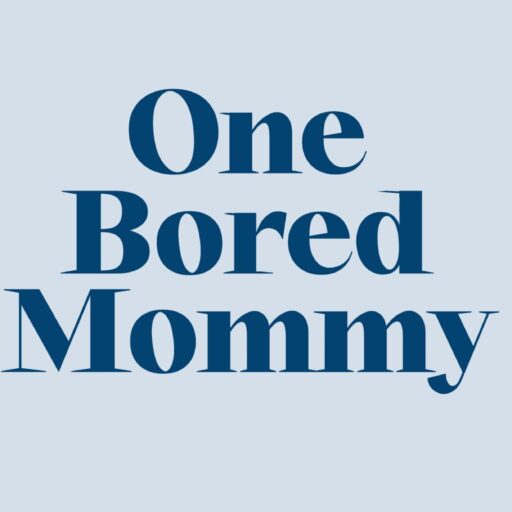Vetted
15 Best Research-Based Parenting Books Every Parent Should Read
A curated list of 15 essential parenting books backed by research and expert advice awaits, offering invaluable insights for every parent.

Looking for the **top 15 research-based parenting books**? Peek into expert guides with evidence-based advice. Books like _’The Whole-Brain Child’_ and _’No-Drama Discipline’_ dish out awesome tips to **boost your kid’s brain growth**. _’Cribsheet’_ and _’Parenting with Infants’_ give **helpful, data-backed advice** for tricky parenting situations. _’The Vaccine Book’_ breaks down vaccines and offers **customizable schedules**. The authors, skilled in child development, earn trust from pros. Using tips backed by science helps you tackle challenges better. For more on **holistic child development** and practical tips, dive into these research-based parenting books.
Key Takeaways
- Look for books authored by experts in child development, psychology, or neuroscience.
- Ensure the books are grounded in scientific research and evidence-based practices.
- Choose updated editions for relevance and accuracy in addressing parenting challenges.
- Prioritize books that offer practical advice, real-life examples, and reputable studies.
- Select books that provide insights into specific parenting concerns and offer proven strategies.
The Whole-Brain Child: 12 Revolutionary Strategies to Nurture Your Child's Developing Mind
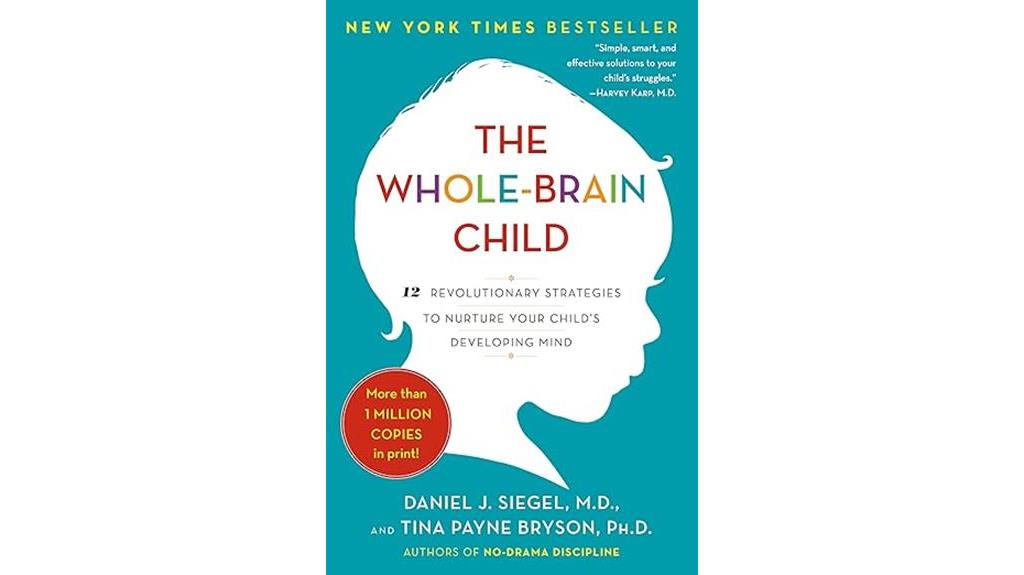
For parents seeking practical strategies to nurture their child's developing mind, 'The Whole-Brain Child' offers insightful and actionable guidance. This book has had a transformative impact on many parents, providing valuable insights into understanding a child's brain, emotions, and behavior.
By offering 12 revolutionary strategies, it helps parents navigate challenging moments with their children effectively. Professionals in the field, such as pediatric therapists, recommend this book for its approachable language and ability to translate complex concepts into understandable information.
While some readers note that the book may cater more to certain demographics, its overall value lies in enhancing parental understanding of child development. Implementing the strategies outlined may require effort, but the positive changes seen in parenting styles make it a worthwhile read for all parents looking to improve their interactions with their children.
Best For: Parents looking to deepen their understanding of child development and enhance their parenting skills through practical strategies.
Pros:
- Offers valuable insights into a child's brain, emotions, and behavior.
- Provides 12 actionable strategies for navigating challenging moments with children.
- Recommended by professionals for its approachable language and practical techniques.
Cons:
- Some readers find the book more tailored to specific demographics.
- Implementing strategies may require significant effort and a change in parenting approach.
- Not comprehensive in addressing all challenging situations or children with specific needs.
No-Drama Discipline: The Whole-Brain Way to Calm the Chaos and Nurture Your Child's Developing Mind
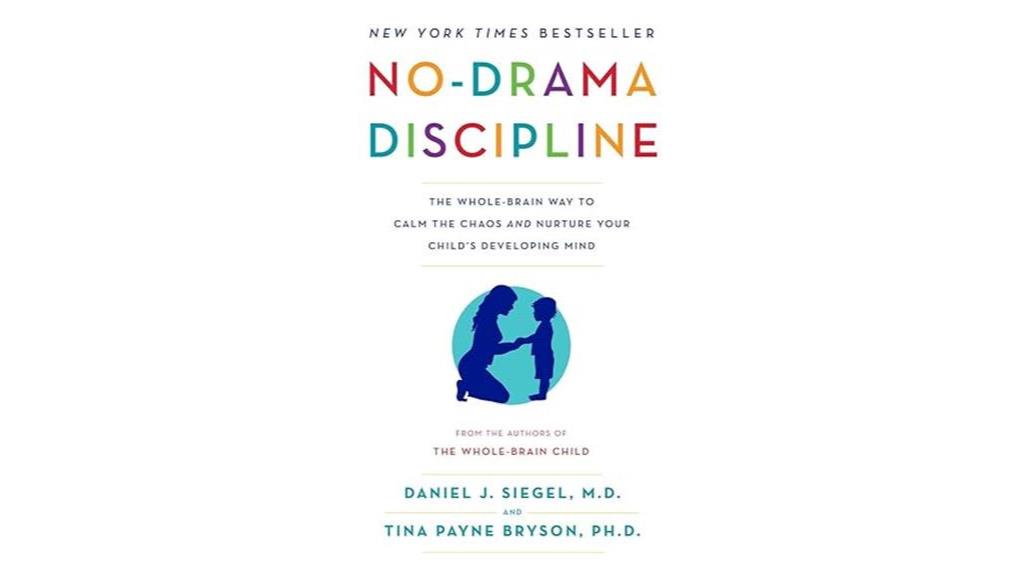
Discover how 'No-Drama Discipline: The Whole-Brain Way to Calm the Chaos and Nurture Your Child's Developing Mind' offers practical tools and insights for transforming parenting approaches and understanding children's developing brains.
This highly recommended book provides parents and caregivers with valuable strategies to handle discipline in a more effective manner. By emphasizing the importance of comprehending a child's developing brain, 'No-Drama Discipline' challenges traditional disciplinary methods and offers a fresh perspective on guiding children.
Readers have reported transformative experiences, praising the book for its practicality and impact on parenting skills. Personal anecdotes highlight the positive changes in managing children's behavior, with a reduction in parenting drama.
The book's universal appeal is evident in global reviews, where readers from diverse backgrounds appreciate its helpful tips on discipline and child development.
Best For: Parents and caregivers seeking practical strategies to handle discipline effectively while understanding and nurturing their child's developing mind.
Pros:
- Offers practical tools and insights for transforming parenting approaches.
- Emphasizes the importance of understanding a child's developing brain.
- Provides valuable strategies for handling discipline in a more effective manner.
Cons:
- May require time and effort to fully implement the suggested techniques.
- Some readers may find the approach challenging if they are used to traditional disciplinary methods.
- The book may not address every unique parenting situation, requiring some adaptation by the reader.
Cribsheet: A Data-Driven Guide to Better, More Relaxed Parenting
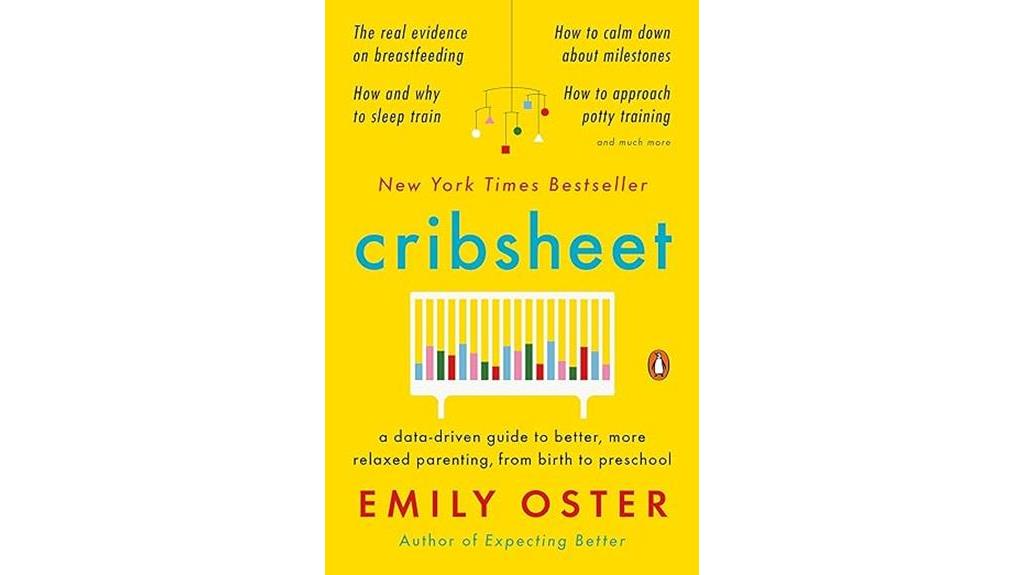
In our search for evidence-based parenting guides, we came across 'Cribsheet: A Data-Driven Guide to Better, More Relaxed Parenting,' a book highly recommended for analytical parents-to-be seeking reliable insights and decision-making support.
This book has garnered positive reviews for being a perfect gift for those who are ambitious or analytical in their approach to parenting. It's praised for presenting data-based answers in an engaging and thoughtful manner without exaggeration. Readers find it easy to read, supportive, and helpful in making informed decisions.
'Cribsheet' stands out for providing great insights and guiding readers towards reliable studies. While some physician scientists have mixed feelings and find parts opinion-based, many appreciate the fresh, data-driven perspective it offers compared to traditional parenting books.
Best For: Parents-to-be who prefer a data-driven and analytical approach to parenting decisions.
Pros:
- Provides data-based answers without exaggeration.
- Engaging and thoughtful read that supports informed decision-making.
- Offers great insights and guides based on reliable studies.
Cons:
- Some content may be considered common sense.
- Parts of the book are opinion-based rather than solely evidence-driven.
- Not available in Spanish, limiting accessibility for some readers.
Brain-Body Parenting: How to Stop Managing Behavior and Start Raising Joyful, Resilient Kids

When seeking a holistic guide rooted in neuroscience principles to support the overall development of your children, 'Brain-Body Parenting' by Dr. Delahooke stands out as an invaluable resource for parents and educators alike. This book moves beyond just managing behaviors; it focuses on nurturing joyful, resilient kids through a unique approach based on polyvagal theory and developmental neuroscience.
Dr. Delahooke's emphasis on understanding each child's individual needs and promoting parental self-care sets this book apart. By encouraging parents to tune into their child's body-brain connection, 'Brain-Body Parenting' offers a thorough approach. With real-life examples and relationship-based strategies, it equips parents to address challenging behaviors effectively while strengthening their bond with their children.
Grounded in neuroscience principles, the book stresses co-regulation and relational safety, emphasizing the importance of creating a safe and connected environment for children to thrive emotionally and develop self-control. Educators and parents praise the practical tools and insights provided, making this book a transformative resource in child development and behavior management.
Best For: Parents and educators seeking a comprehensive guide rooted in neuroscience principles to nurture joyful, resilient children through a holistic approach.
Pros:
- Offers practical tools and real-life examples for addressing challenging behaviors effectively.
- Emphasizes the importance of understanding individual child needs and promoting parental self-care.
- Grounded in neuroscience principles, highlighting co-regulation and relational safety in parenting.
Cons:
- May require time and effort to fully integrate the recommended strategies into daily parenting practices.
- Some readers may find the scientific concepts challenging to grasp initially.
- The approach may not resonate with parents who prefer more traditional behavior management techniques.
The Science of Parenting: How Today's Brain Research Can Help You Raise Happy, Emotionally Balanced Children
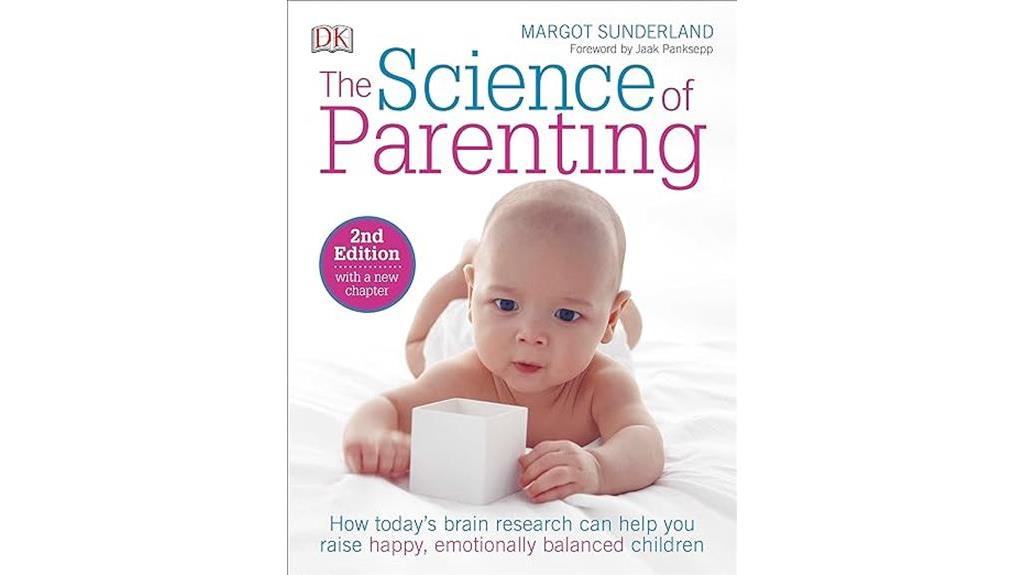
For parents seeking evidence-based guidance on nurturing emotionally balanced children, 'The Science of Parenting: How Today's Brain Research Can Help You Raise Happy, Emotionally Balanced Children' is an invaluable resource.
This book comes highly recommended for its insights into child development rooted in neuroscience. It offers practical and easy-to-understand advice, aiding parents in making informed choices about their parenting styles.
While some readers question the author's citation of studies and specific information on certain topics, the book still serves as a valuable tool for understanding tantrums, bonding with infants, and establishing routines and boundaries.
Endorsed by professionals like social workers, nurses, and psychologists, this resource is internationally recognized for its scientific approach to parenting and clear explanations of infant brain development and behavior.
Best For: Parents and caregivers looking for evidence-based insights into child development and practical advice on nurturing emotionally balanced children.
Pros:
- Valuable insights into child development based on neuroscience.
- Practical advice on handling tantrums and establishing routines and boundaries.
- Endorsed by professionals in fields such as social work, nursing, and psychology.
Cons:
- Some readers question the author's citation of studies and specific information on certain topics.
- Controversial stance on co-sleeping and sleep training techniques may not align with all parenting styles.
- Limited concrete information on certain subjects may leave readers seeking more in-depth explanations.
Untangled: Guiding Teenage Girls Through the Seven Transitions into Adulthood
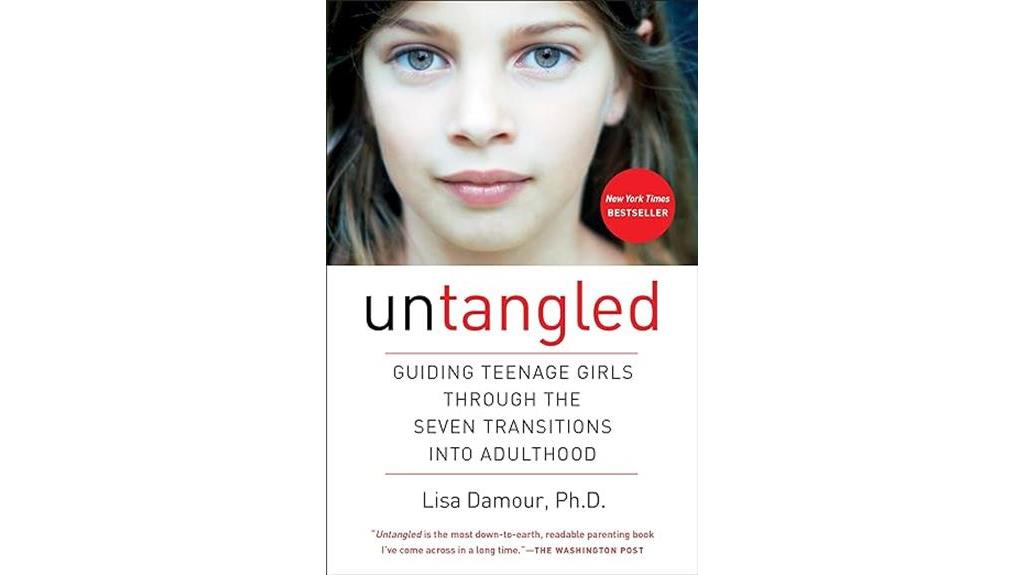
Explore how 'Untangled: Guiding Teenage Girls Through the Seven Shifts into Adulthood' offers valuable insights and guidance for parents journeying through the challenges of raising teenage daughters. This book has received positive reviews from parents who find it highly readable and applicable.
It provides valuable insights into understanding teenage behavior, offering recommendations for parents of both teenage girls and boys. Parents facing the struggles of adolescence appreciate the encouragement and tools provided in this book. Even grandparents have found it helpful in relating to their granddaughters.
The specific chapters in 'Untangled' are particularly beneficial for parents of pre-teens and teens, as evidenced by anecdotes sharing how the book has helped in understanding and relating to teenage daughters. Overall, this book comes highly recommended for parents seeking advice on maneuvering the complexities of raising teenage girls.
Best For: Parents seeking valuable insights and guidance on understanding and supporting their teenage daughters through the transitions into adulthood.
Pros:
- Highly readable and applicable for parents.
- Provides valuable insights into teenage behavior.
- Offers encouragement and tools for parents facing the challenges of adolescence.
Cons:
- Some feedback on book structure and page numbering issues.
- May not address all specific parenting challenges faced by every parent.
- Limited focus on teenage boys compared to teenage girls.
How Your Child Learns Best: Brain-Friendly Strategies to Ignite Learning
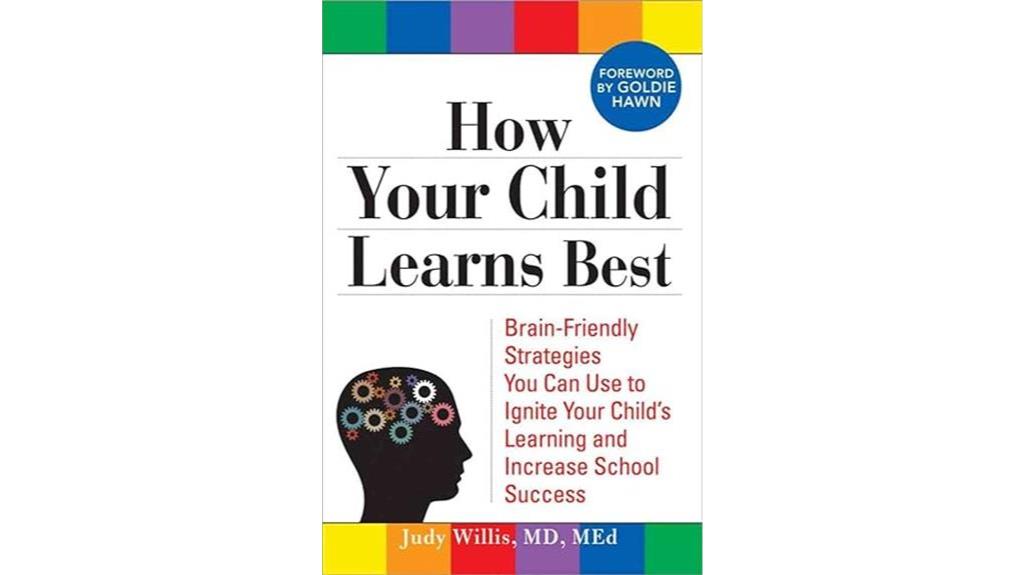
The book 'How Your Child Learns Best: Brain-Friendly Strategies to Ignite Learning' is a valuable resource for parents looking to understand and support their child's learning process. It offers insights into nurturing your child's natural learning abilities by exploring their innate curiosity, creativity, and humor.
The book examines brain science, providing a deeper understanding of how children learn and offering practical strategies for parents to implement. By exploring and explaining studies on learning, Dr. Willis suggests ideas that can help parents guide their children through the learning process effectively.
Many readers find the content highly useful, whether they're helping their child with specific subjects like math or seeking to improve their own learning strategies. Despite some mixed reviews, the book remains a popular choice for parents aiming to enhance their child's learning experience.
Best For: Parents seeking practical strategies to support their child's learning process by tapping into their innate curiosity, creativity, and humor.
Pros:
- Offers insights into nurturing natural learning abilities in children.
- Provides practical strategies based on brain science for effective guidance.
- Useful for parents looking to improve their own learning strategies as well.
Cons:
- Some readers may find the content repetitive if they have read similar educational books.
- Limited new information for those already well-versed in education literature.
- Mixed reviews regarding the uniqueness of the advice provided.
The Connected Parent: Real-Life Strategies for Building Trust and Attachment
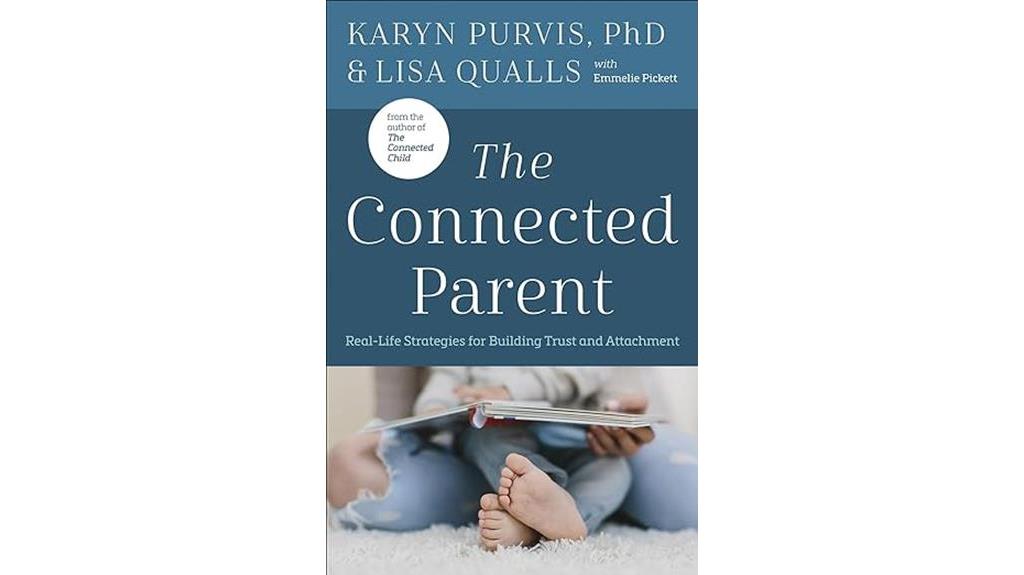
Explore the practical strategies in 'The Connected Parent' to enhance trust and attachment with children, especially those from challenging backgrounds. Authored by Dr. Karyn Purvis and Lisa Qualls, the book is a valuable resource that blends scientific knowledge with practical advice.
It emphasizes the importance of establishing connections throughout the day, understanding children's behaviors, creating a sense of safety, and maintaining a balance between structure and nurture in parenting. Readers praise the book for its impact on families, renewing hope, compassion, and strength in managing the complexities of parenting children with complex trauma.
By offering insights on Trust-Based Relational Intervention (TBRI) and practical skills for parenting, 'The Connected Parent' is recommended for adoptive parents and professionals seeking to cultivate secure and trusting relationships with children.
Best For: Parents seeking practical strategies to build trust and attachment with children from challenging backgrounds.
Pros:
- Offers science-based information and practical advice.
- Provides real-life stories and key takeaways for reflection.
- Emphasizes the importance of connection, understanding behavior, and maintaining a balance in parenting.
Cons:
- May require consistent effort and time to implement strategies effectively.
- Some readers may find certain concepts challenging to apply in their unique parenting situations.
- Not all strategies may work equally well for every child or family dynamic.
Plant-Based Baby and Toddler Feeding Guide
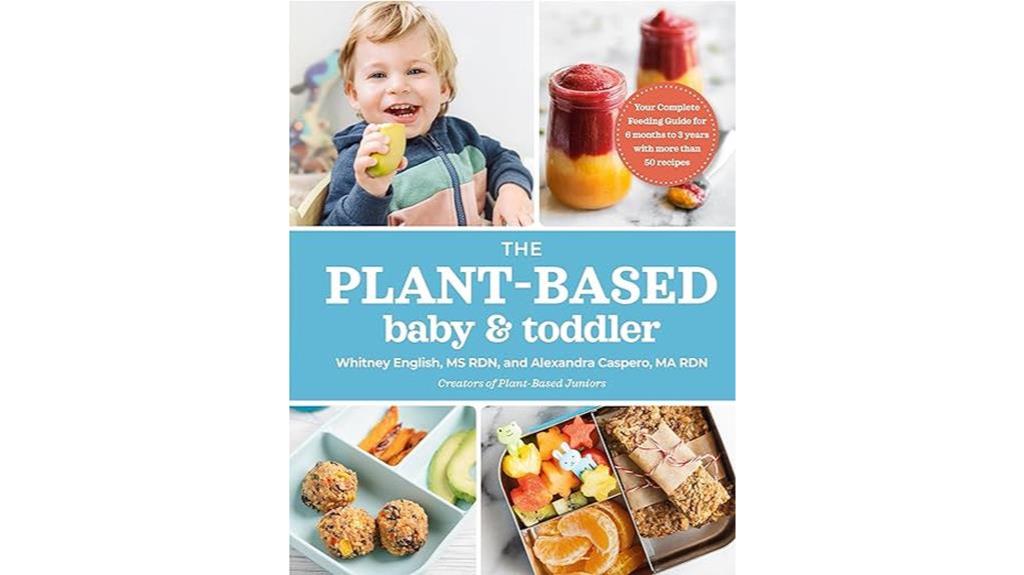
For parents interested in confidently managing plant-based diets for their babies and toddlers, the 'Parenting Books for Every Parent' presents a thorough Plant-Based Baby and Toddler Feeding Guide that offers nutritional information, recipes, and practical advice.
Readers have praised the book for being incredibly helpful, informative, and well-equipped, providing confidence in feeding plant-based diets to young children. Some standout recipes include PBJ's Blender Bean muffins and pasta dishes, although there have been mentions of recipe failures like the bean muffins and veggie omelette cups.
The book not only offers family-friendly recipe alterations but also emphasizes the importance of supplements in plant-based diets. With detailed nutrient needs at each stage of a baby's development and strategies for meeting these requirements, the book is a valuable resource for parents aiming to raise adventurous eaters.
Best For: Parents seeking comprehensive guidance on successfully implementing plant-based diets for their babies and toddlers.
Pros:
- Incredibly helpful, informative, and well-equipped book.
- Provides confidence in feeding plant-based diets to young children.
- Detailed nutrient needs at each stage of a baby's development and strategies for meeting requirements.
Cons:
- Lack of organization, such as the absence of a table of contents.
- Concerns about conflicting information and lack of in-text citations.
- Suggestions needed for better editing and improving the structure and clarity in future editions.
Zero to Five: 70 Essential Parenting Tips Based on Science

Seeking a thorough parenting guide grounded in science and practicality? 'Zero to Five: 70 Essential Parenting Tips Based on Science' might be the answer. This book has garnered positive reviews and personal experiences from readers who appreciate its practical and enjoyable format.
Praises are showered upon the valuable information, relatable parenting stories, and science-based tips it offers. The book's features, including its organization, visuals, and age-specific advice, are commended, with the spiral-bound layout and color-coded themes making maneuvering a breeze.
Readers highly recommend this book as essential reading for parents, emphasizing its logical and structured information. While some found challenges in immediate application, the overall impact and usability of 'Zero to Five' are recognized for providing a solid foundation for parents guiding the early years of their child's life.
Best For: Parents seeking a research-based and practical parenting guide for the early years of their child's life.
Pros:
- Practical and enjoyable format with valuable information and relatable parenting stories.
- Organized layout with visuals and age-specific tips for easy navigation.
- Highly recommended by readers for its logical and structured scientific content.
Cons:
- Some readers may find immediate application of tips challenging.
- Criticisms exist regarding usability and practicality.
- A few reviewers felt the book lacked unique insights.
The Spiritual Child: The New Science on Parenting for Health and Lifelong Thriving
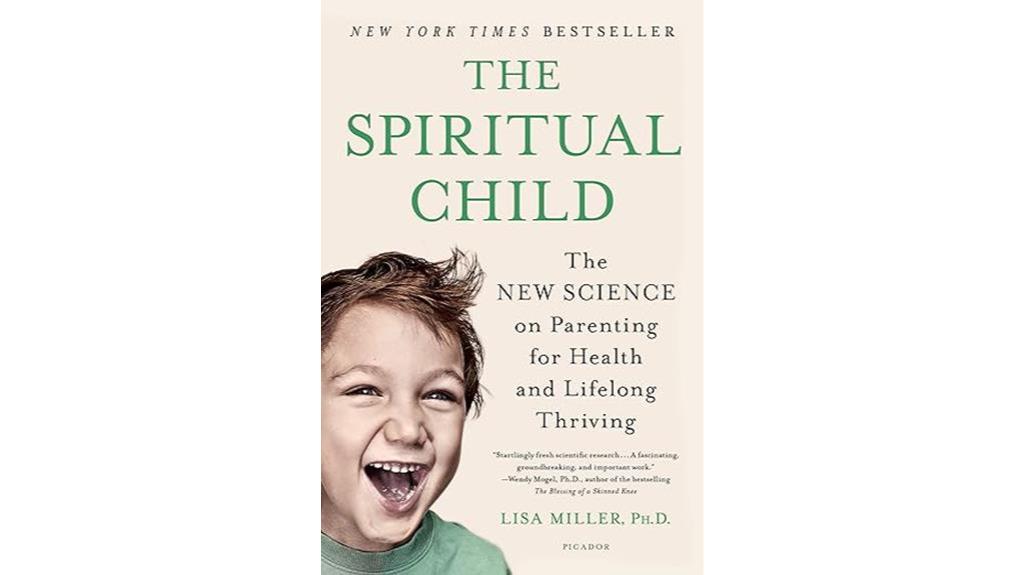
Explore how 'The Spiritual Child: The New Science on Parenting for Health and Lifelong Thriving' offers valuable insights for parents seeking to nurture their children's spirituality for a well-rounded upbringing. This book delves into the importance of spiritual growth and ongoing development in children, emphasizing the benefits of nurturing spirituality for their healthy adulthood.
By providing guidance on how to balance societal pressures and expectations, parents can support their children in maneuvering life's challenges. Reviews and testimonials highlight the positive impact of the book, with readers appreciating its content and recommendations for parents and educators.
With a focus on connecting with a child's unique spiritual design, 'The Spiritual Child' bridges the gap between science and spirituality, offering international perspectives and personal experiences that enrich the understanding of children's spiritual trajectory.
Best For: Parents and caregivers looking to understand the significance of spirituality in their child's development and seeking practical guidance on nurturing their spiritual growth.
Pros:
- Offers valuable insights on nurturing children's spirituality for a well-rounded upbringing.
- Provides guidance on balancing societal pressures and expectations to support children in navigating life's challenges.
- Bridges the gap between science and spirituality, enriching the understanding of children's spiritual trajectory.
Cons:
- Delivery instructions may not always be followed correctly.
- Limited international perspectives in some sections of the book.
- Personal experiences shared in the book may not resonate with all readers.
Simplicity Parenting: Using the Extraordinary Power of Less to Raise Calmer, Happier, and More Secure Kids
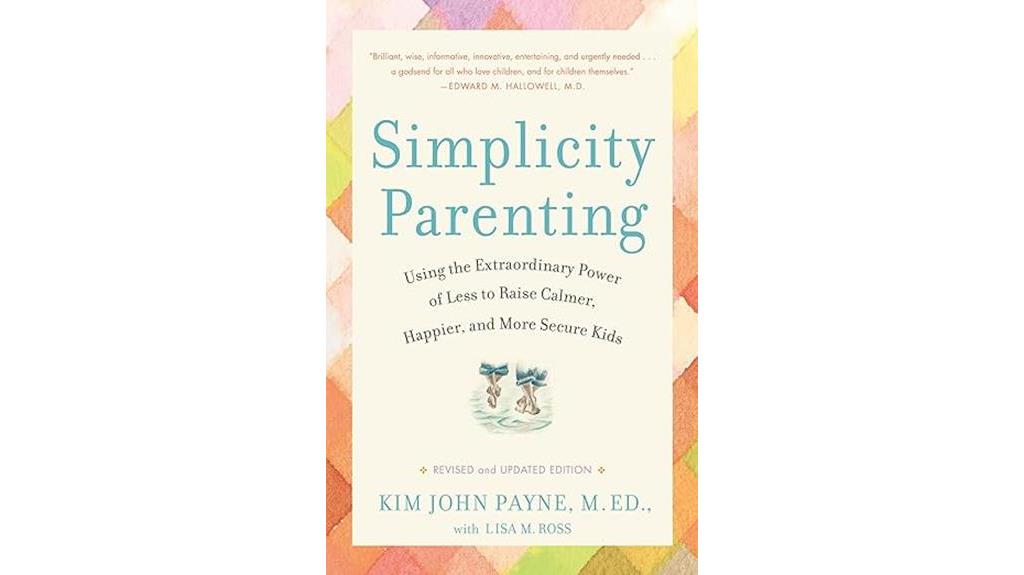
In our quest for raising calmer, happier, and more secure children, 'Simplicity Parenting: Using the Extraordinary Power of Less' serves as an essential guide for parents maneuvering through the complexities of modern parenting.
This book acts as a vital reminder in a consumer-driven society, advocating for simplification to enhance family life. With a well-crafted and practical approach, it offers parents valuable advice on nurturing a peaceful and secure environment for their children.
Readers appreciate the book's easy-to-follow content, finding inspiration and actionable steps to implement in their daily lives. While some critics highlight the need for more age-specific information, the overall consensus praises the book for its relevance and transformative impact on parenting approaches.
'Simplicity Parenting' is hailed as a must-read for parents seeking a more intentional and fulfilling parenting journey.
Best For: Parents looking to simplify their parenting approach and create a calmer, happier, and more secure environment for their children.
Pros:
- Provides practical advice for implementing a simpler parenting style.
- Well-written content that is easy to understand and inspiring.
- Validates common parenting challenges and offers strength and inspiration to readers.
Cons:
- Some readers found certain metaphors confusing.
- Lack of age-specific information may make it less practical for some parents.
- Certain topics in the book are considered overly lengthy by critics.
The Kazdin Method for Parenting the Defiant Child
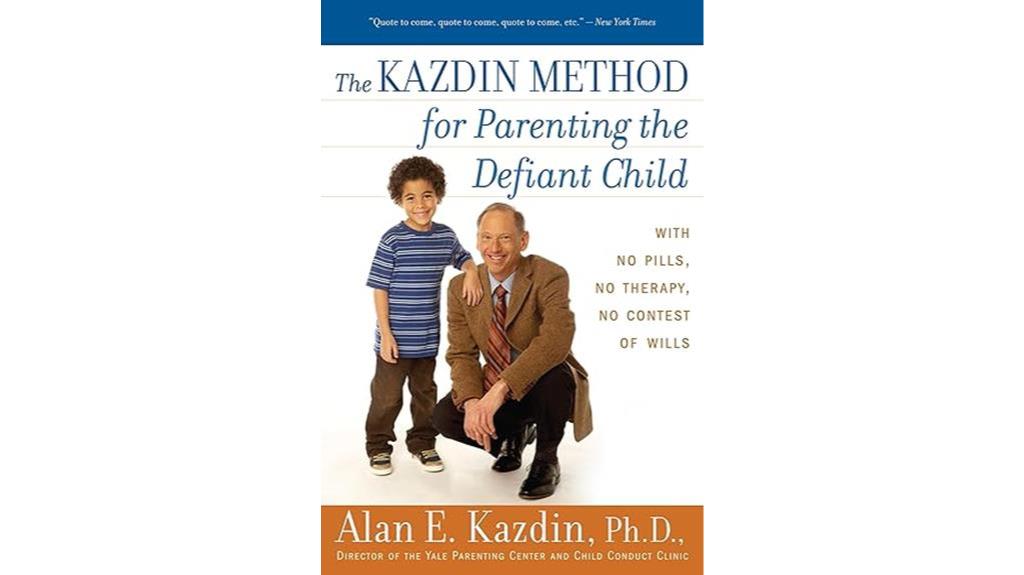
For parents dealing with defiant behavior in their children, the Kazdin Method stands out as a practical and effective approach recommended by professionals. Parent testimonials highlight the method's success in improving family dynamics and bringing about positive behavior changes in children.
The ease of understanding and implementing the method is particularly emphasized, making it accessible for parents seeking solutions. Endorsed by a psychologist specializing in behavior problems in children, the Kazdin Method emphasizes positive, solution-focused, and empathic parenting. It promotes collaboration between parents and children in developing behavioral plans tailored to the child's needs.
The book offers detailed content on behavior modification strategies for children, with recommendations on customization based on the child's age and the severity of issues. Additionally, international perspectives discuss the method's practicality and effectiveness in modifying children's behavior across different cultural contexts.
Best For: Parents seeking a practical and effective approach to address defiant behavior in their children.
Pros:
- Positive outcomes in improving family dynamics and behavior changes in children.
- Emphasis on collaboration between parents and children in developing tailored behavioral plans.
- Detailed content and recommendations on behavior modification strategies for children.
Cons:
- Customization based on the child's age and severity of issues may require additional effort.
- Not all children may respond equally well to the method.
- Some parents may find it challenging to consistently implement the program.
The Self-Driven Child: The Science and Sense of Giving Your Kids More Control Over Their Lives
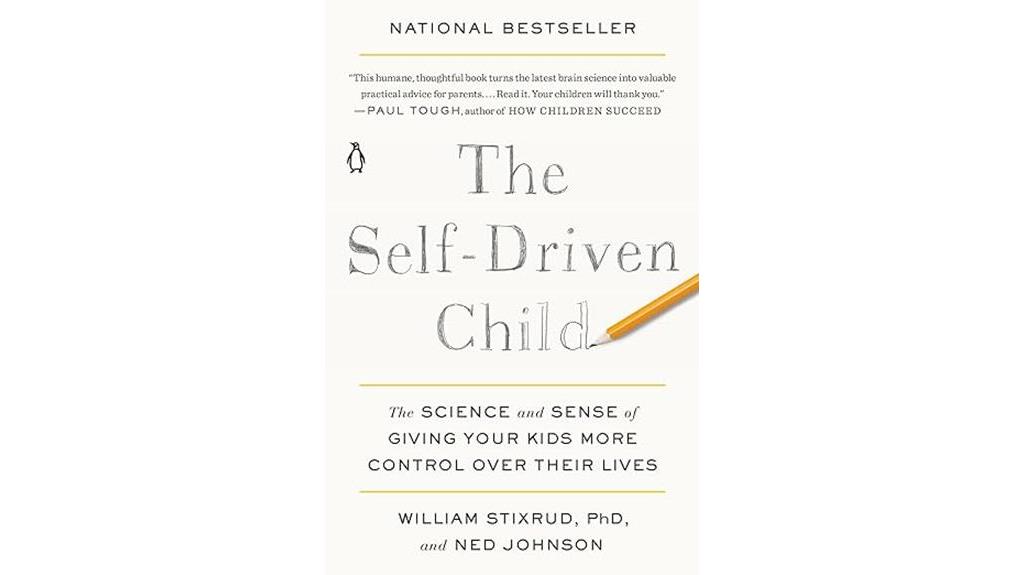
As parents seeking to empower our children and reduce stress, 'Parenting Books for Every Parent' is the ideal choice for those interested in fostering autonomy and competence in their kids.
'The Self-Driven Child: The Science and Sense of Giving Your Kids More Control Over Their Lives' emphasizes the importance of creating a sense of control in children's lives to prepare them for the challenges they'll face.
The book, written by William Stixrud and Ned Johnson, offers practical advice on how parents, coaches, and teachers can help children succeed by advocating for autonomy and competence.
By taking on a consulting role rather than a controlling one, parents can empower their children with mental strategies and practical approaches to navigate stress and develop independence.
The book's insights from neuroscience and psychology provide a valuable guide for those looking to improve parent-child dynamics and foster a more self-driven approach in their children's lives.
Best For: Parents, coaches, and teachers seeking practical advice on empowering children and reducing stress to help them succeed.
Pros:
- Practical advice on fostering autonomy and competence in children.
- Advocates for a consulting role for parents to empower their children.
- Insights from neuroscience and psychology in a relatable manner.
Cons:
- May require a shift in parenting mindset for those used to a controlling approach.
- Some readers may find the concepts challenging to implement initially.
- Focus on stress management and empowerment may not resonate with all parenting styles.
The Vaccine Book: Making the Right Decision for Your Child
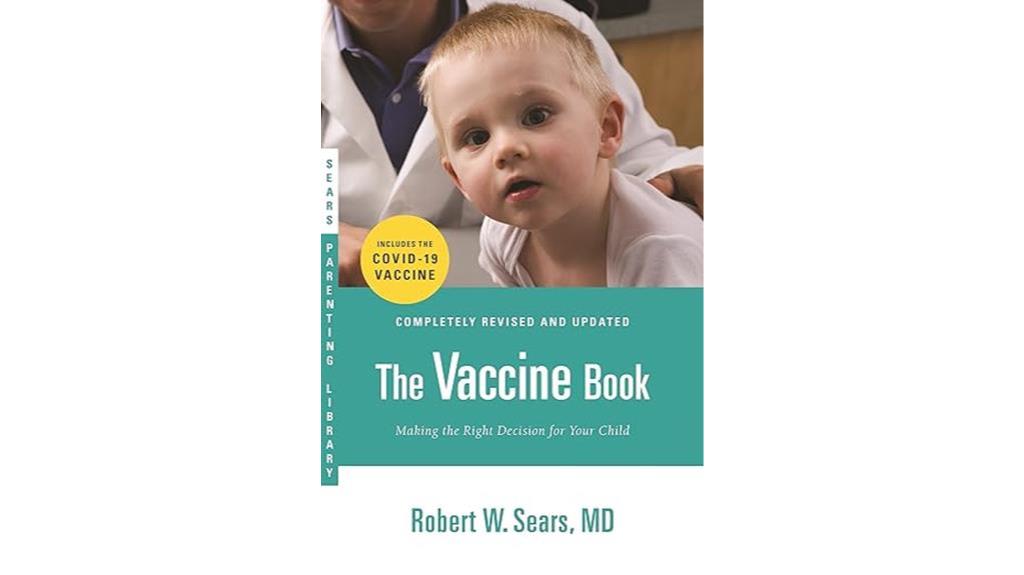
With its detailed breakdown of vaccines and customizable schedules, 'The Vaccine Book: Making the Right Decision for Your Child' is a valuable resource for parents seeking well-informed choices on vaccination. Dr. Sears meticulously outlines the history, risks, side effects, and ingredients of each vaccine, allowing parents to make educated decisions.
The book's neutral presentation of facts empowers individuals to maneuver through the intricate landscape of vaccination with clarity. By offering customizable vaccine schedules tailored to specific needs, 'The Vaccine Book' provides a sense of control and assurance for parents. Dr. Sears' balanced approach challenges readers to contemplate scientific evidence while respecting the difficulty of vaccine decisions.
Parents appreciate the book's unbiased nature, informative content, and the opportunity to create personalized vaccination plans. 'The Vaccine Book' stands as a thorough and valuable tool for all parents journeying through the vaccination process.
Best For: Parents who seek a comprehensive and balanced guide to making informed decisions about vaccinations for their children.
Pros:
- Detailed breakdown of each vaccine, including history, risks, side effects, and ingredients.
- Customizable vaccine schedules tailored to individual situations.
- Balanced and fair-minded approach to vaccination, challenging parents to make decisions based on scientific evidence.
Cons:
- Some parents may find the information overwhelming or complex.
- Not all readers may agree with the book's stance on vaccination.
- Limited focus on addressing specific concerns or questions parents may have about vaccines.
Factors to Consider When Choosing Research Based Parenting Books
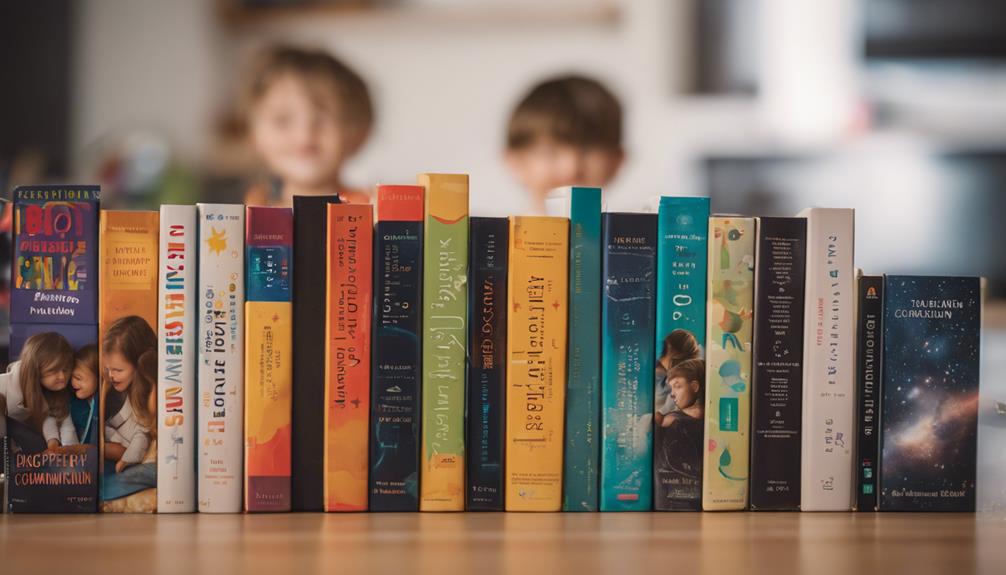
When selecting research-based parenting books, it's essential to take into account factors like the selection criteria, relevance check, author expertise, practical application, and evidence-based content.
These elements help guarantee that the book aligns with your parenting style and provides accurate information backed by research. By assessing these aspects, parents can make informed decisions on which books will best suit their needs and help them navigate the challenges of raising children.
Selection Criteria
Consider the qualifications and expertise of the author in child development and parenting when selecting research-based parenting books. Look for books that are grounded in scientific research and evidence-based practices.
It's essential to review feedback and recommendations from professionals in the field of child psychology or education to verify the credibility of the book. Check if the book offers practical strategies and actionable advice that can be easily implemented by parents.
Make sure the book addresses your specific concerns or challenges in parenting to confirm its relevance to your situation. Additionally, consider the author's background in parenting, child development, or healthcare to gauge their level of expertise.
Choose books that cite reputable studies and research to substantiate the information provided. Evaluate how the book approaches controversial topics like vaccination, discipline, or nutrition to ascertain it aligns with your beliefs.
Opt for updated editions or recent publications to access current information reflecting the latest research and recommendations. Seek recommendations from trusted sources such as healthcare professionals, educators, or parenting support groups to discover well-received research-based parenting books.
Relevance Check
Evaluating the credibility and relevance of the author's qualifications is essential when selecting research-based parenting books. It's important to take into account the author's background in child development or psychology, making sure they've the expertise to provide reliable information. Look for books that are grounded in scientific research, with references to studies backing up their claims. Checking reviews from professionals like pediatricians or therapists can further confirm the book's reliability.
Additionally, take into consideration the content structure of the book, seeking practical strategies and clear explanations that can be applied to real-life parenting situations. Make sure the book addresses your specific parenting challenges and aligns with your philosophy. Checking the publication date is important to ensure the information is current. References and citations within the book can also indicate credibility.
Author Expertise
Author expertise plays an essential role in determining the credibility and reliability of research-based parenting books. When selecting a parenting book, it's important to take into account the author's background and qualifications. Look for authors with expertise in fields such as child development, psychology, neuroscience, or related areas.
Authors who have practical experience working with children, parents, or families can offer valuable insights in their books. Advanced degrees, published research, and clinical practice all contribute to the author's credibility. Endorsements from professionals in the field further validate the author's expertise.
Books authored by individuals with relevant qualifications like pediatricians, child psychologists, educators, or researchers in child development are often reliable sources of information. Checking the author's credentials, experience, and affiliations can help assess their expertise in the subject matter.
Authors with a background in scientific research or clinical practice are more likely to provide evidence-based information in their books. Considering authors with a track record of published research or a strong reputation in the parenting and child development field can further enhance the credibility of the book.
Practical Application
Implementing strategies from research-based parenting books involves applying evidence-based information to real-life parenting situations, fostering positive changes in parent-child relationships. By utilizing the insights and recommendations provided in these books, parents can make informed decisions about how to navigate the complexities of raising children.
Practical application may require adapting suggestions to align with individual parenting styles and the unique needs of each child. These evidence-based resources offer actionable advice supported by research studies, giving parents confidence in the effectiveness of the strategies proposed.
Through the application of recommended techniques in day-to-day interactions with their children, parents can observe improvements in child behavior and development. Research-based parenting books equip parents with practical tools and tips that can be seamlessly integrated into their daily routines, empowering them to create a nurturing environment conducive to their children's growth and well-being.
Evidence-Based Content
Considering the credibility of authors and the depth of research cited can assist parents in selecting evidence-based parenting books that offer reliable and scientifically-backed guidance for effective child-rearing practices. Evidence-based parenting books are grounded in research and scientific studies on child development, providing factual information and data to support their claims.
Authors of these books often cite reputable sources and studies, prioritizing accuracy and reliability in their content to offer proven strategies for effective parenting. Readers can trust that the information presented is backed by scientific evidence, ensuring reliability and trustworthiness.
This content helps parents make informed decisions based on research findings, offering up-to-date and accurate information on parenting practices. By choosing evidence-based parenting books, parents can feel confident in the credibility and accuracy of the guidance provided, leading to more effective and informed parenting strategies for the well-being of their children.
Frequently Asked Questions
How Can I Handle Sibling Rivalry Using the Strategies in These Parenting Books?
When handling sibling rivalry, we apply strategies from parenting books by addressing conflicts calmly and setting clear expectations.
Encouraging positive communication and problem-solving helps foster healthy relationships between siblings.
Implementing fair consequences for negative behavior promotes cooperation and respect.
Recognizing and acknowledging each child's feelings validates their emotions and helps them develop empathy.
Consistent reinforcement of positive behaviors strengthens family dynamics and reduces conflict over time.
Are There Specific Tips for Parents of Children With Special Needs?
When it comes to parenting children with special needs, it's vital to seek out resources tailored to their unique requirements. Understanding the specific challenges they face is essential for providing appropriate support and guidance.
Research-backed strategies can offer valuable insights into effective ways to address the needs of children with diverse abilities and conditions, helping parents navigate the complexities of raising a child with special needs with confidence and competence.
Can These Books Help With Discipline for Children With Adhd?
Yes, these books can offer valuable insights on effective discipline strategies for children with ADHD.
By understanding the research-based methods recommended in these resources, parents can tailor discipline approaches to suit their child's specific needs.
Techniques such as positive reinforcement, clear communication, and consistency are emphasized, which can greatly benefit parents managing the challenges of disciplining a child with ADHD.
Do These Books Address the Challenges of Single Parenting?
Yes, these books often tackle the challenges faced by single parents.
They offer practical strategies and tips tailored to single-parent households.
Topics may include managing time effectively, nurturing a strong parent-child bond, and seeking support networks.
Is There Guidance on Navigating Technology Use and Screen Time for Children?
When it comes to managing technology use and screen time for children, it's crucial to establish clear guidelines. Encouraging educational content and setting limits can help create a balanced approach.
Monitoring online activities and fostering open communication are key components in effectively handling screen time. By engaging in these practices consistently, parents can promote healthy digital habits and guarantee a positive relationship with technology for their children.
What Makes Waldorf Parenting Books Different from Research-Based Parenting Books?
When it comes to parenting books, you may wonder what sets the best Waldorf parenting books apart from research-based parenting books. The answer lies in the emphasis on holistic child development, creativity, and a connection to nature. These books offer a unique perspective on raising children in today’s busy world.
Conclusion
To sum up, selecting the best research-based parenting books is crucial for improving our parenting skills and gaining a deeper understanding of our children.
Just like a well-oiled machine, these books offer the essential tools and strategies to navigate the demanding journey of parenthood with confidence and knowledge.
Keep in mind, knowledge is power, and investing in quality resources can significantly impact the upbringing of happy, healthy, and resilient children.
Vetted
15 Best Natural Parenting Books Every Parent Should Read
Yearning for insightful guidance on natural parenting? Discover the top 15 books every parent should read for holistic approaches and valuable tips.

Navigating natural parenting involves discovering the **best books** on pregnancy, childbirth, and parenting styles. **’The Mama Natural Week-by-Week Guide’** gives amazing advice. **’Raising Good Humans’** offers mindful parenting tips. **’Natural Hospital Birth’** mixes natural and hospital births wonderfully. **’Your Child’s Best Face’** shares solid child health tips. **’The Nourishing Traditions Book’** explores traditional nutrition. **’Smart Medicine for a Healthier Child’** presents holistic remedies. **’Thriving with ADHD’** aids in natural ADHD management. Dive into these top natural parenting books and enjoy the journey!
Key Takeaways
- Practical tips for pregnancy, labor, and postpartum.
- Insightful strategies for handling parenting challenges.
- Empowerment for unmedicated hospital births.
- Solutions for child health and wellness.
- Traditional nutrition wisdom for holistic child-rearing.
The Mama Natural Week-by-Week Guide to Pregnancy and Childbirth
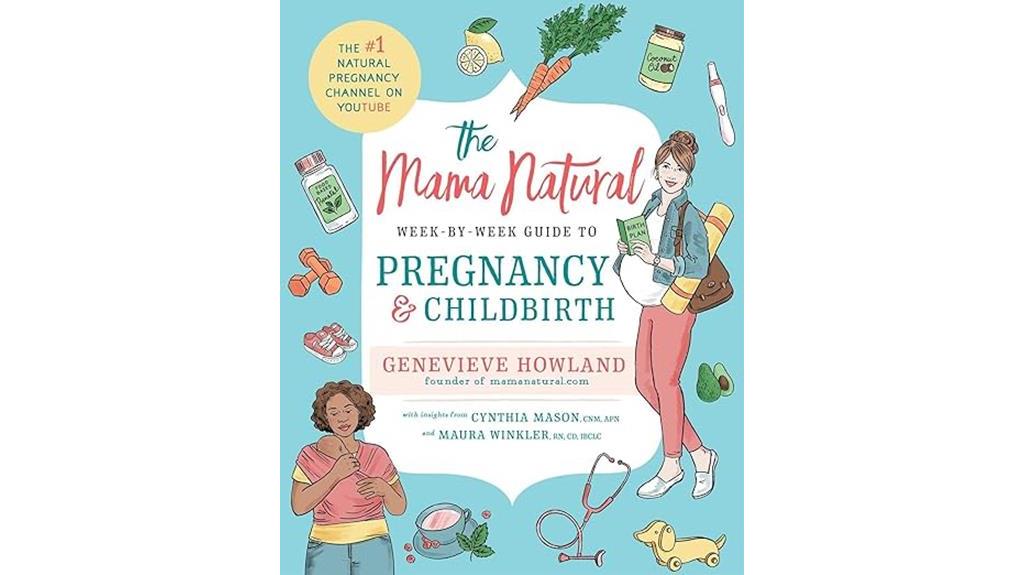
For those seeking a thorough and natural approach to pregnancy and childbirth, 'The Mama Natural Week-by-Week Guide' is an invaluable resource.
This detailed book breaks down essential information into easily digestible sections, covering everything from appointments and tests to exercises and healthy practices during pregnancy.
I appreciate the science-based research woven throughout the book, along with its beautiful illustrations that enhance understanding.
The week-by-week guide offers a unique perspective on pregnancy from a natural angle, making it a standout choice for expectant mothers.
Readers have shared positive experiences with the book, highlighting its practical tips, illustrations, and guidance on various aspects of pregnancy, labor, postpartum, and even pregnancy loss.
Whether you're a first-time mom or already experienced, this book emphasizes the importance of informed decision-making throughout your pregnancy journey.
Best For: Expectant mothers seeking a comprehensive and natural approach to pregnancy and childbirth.
Pros:
- Provides easily digestible information on various pregnancy-related topics.
- Offers practical tips, beautiful illustrations, and guidance for pregnancy, labor, and postpartum.
- Emphasizes informed decision-making and encourages a natural perspective on pregnancy.
Cons:
- Some readers have reported issues with printing errors and damaged copies.
- Minor concerns about the cost and appearance of the book.
- Quality feedback varies among readers.
Raising Good Humans: A Mindful Guide to Breaking the Cycle of Reactive Parenting
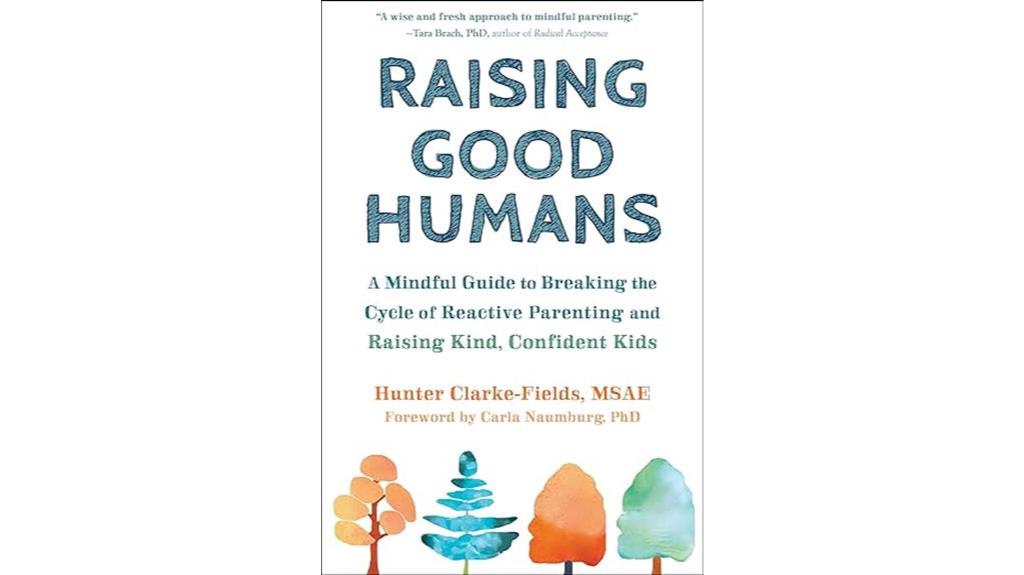
This insightful guide on breaking the cycle of reactive parenting is a valuable resource for parents seeking to enhance their approach to raising children mindfully. With positive reviews highlighting its helpfulness and engaging delivery, 'Raising Good Humans' has resonated with many readers, especially first-time parents.
The book's impact on parenting is evident, with readers mentioning a shift in their parenting style and the ability to navigate challenging moments with their children more effectively. While some readers faced challenges in unlearning past habits, the emphasis on self-work and mindfulness practices proved beneficial in their parenting journey.
Personal experiences shared by readers showcase the book's effectiveness in identifying triggers, promoting self-reflection, and ultimately, helping individuals become better parents. By emphasizing specific techniques like I language and mindfulness practices, this book equips parents with the tools to raise confident and emotionally resilient children.
Best For: Parents looking to break the cycle of reactive parenting and adopt a mindful approach to raising confident and resilient children.
Pros:
- Insightful and engaging delivery that resonates with readers.
- Effective strategies for handling difficult parenting moments.
- Emphasis on self-work and mindfulness practices for personal growth as a parent.
Cons:
- Some readers may find it challenging to unlearn past parenting habits.
- Initial difficulty in approaching mindfulness practices for a few readers.
- The emphasis on self-reflection and personal growth may require significant effort and commitment.
Natural Hospital Birth 2nd Edition: The Best of Both Worlds
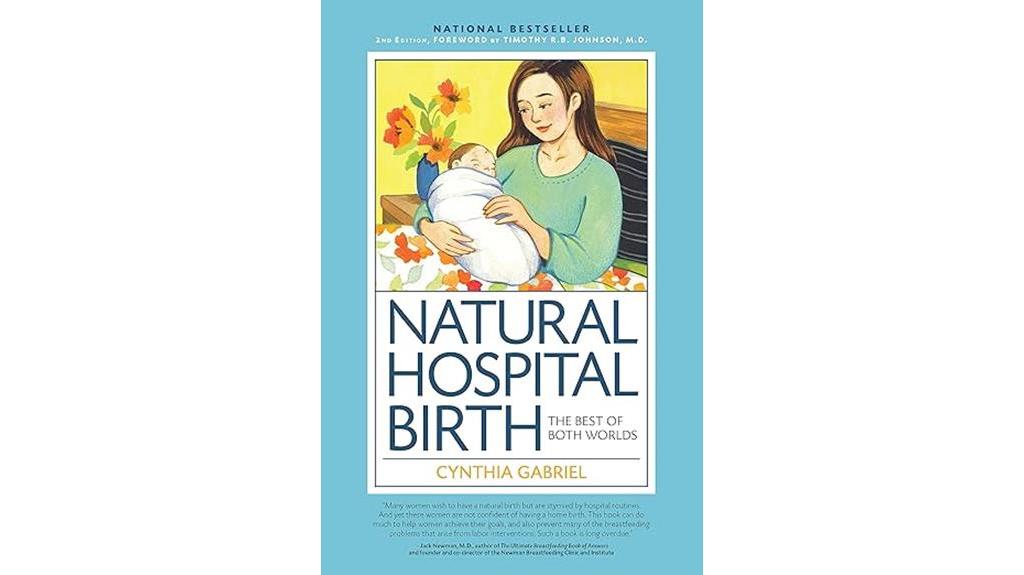
With its practical guidance and real-life accounts, 'Natural Hospital Birth 2nd Edition: The Best of Both Worlds' is an invaluable resource for expectant mothers seeking to prepare for unmedicated hospital births.
The book not only offers information on natural birthing techniques but also provides insights into maneuvering the hospital environment while aiming for a medication-free delivery.
Readers appreciate the unbiased approach taken by the author, which allows all birthing mothers to benefit from the book's content, regardless of their birth plan.
By sharing personal experiences and testimonials, the book instills confidence in women, empowering them to advocate for their preferences during childbirth.
'Natural Hospital Birth 2nd Edition' stands out for its practical advice, helping mothers create birth plans aligned with their desires and make informed decisions throughout the labor process.
Best For: Expectant mothers seeking to prepare for unmedicated hospital births and looking for unbiased, practical guidance.
Pros:
- Valuable information for preparing for unmedicated hospital births
- Real-life accounts and personal experiences shared
- Empowers women to make informed decisions and advocate for their preferences during childbirth
Cons:
- May not cater to those planning medicated births
- Limited focus on alternative birthing options outside of hospitals
- Some readers may find the content repetitive if already well-versed in natural birthing techniques
Your Childs Best Face: How To Nurture Top Health & Natural Glow
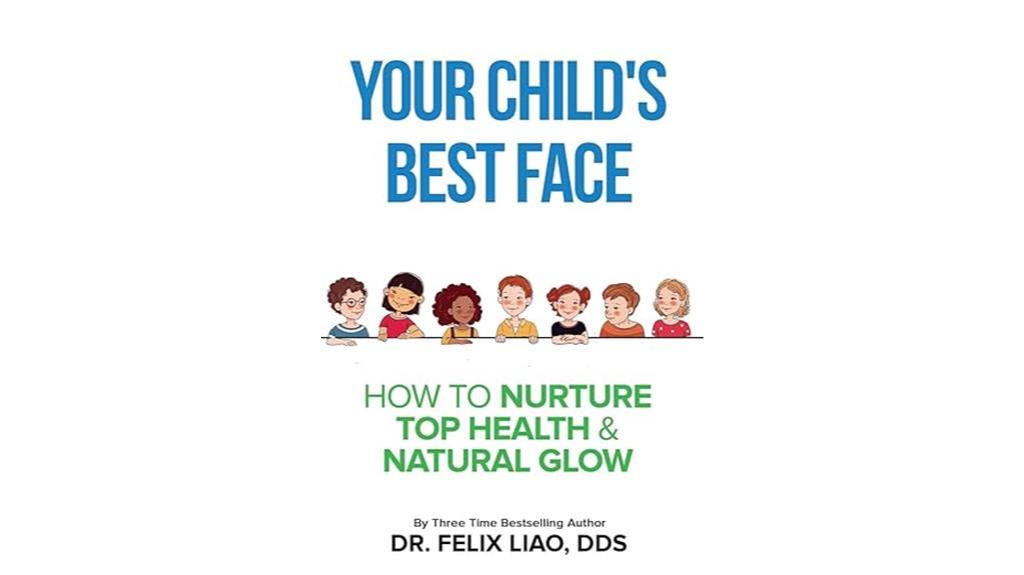
Exploring your child's top health and natural glow is made accessible through the insightful guidance provided in 'Your Child's Best Face,' a must-read for parents seeking to prioritize their child's overall well-being.
This book investigates the facial signs that can indicate underlying dental and systemic issues in children. It stresses the importance of early interventions to improve health outcomes.
In today's modern lifestyle, factors like diet and breathing habits can impact a child's facial development and overall health. 'Your Child's Best Face' offers practical solutions to reverse issues like mouth breathing and cavities, highlighting the link between facial symmetry and gut health.
With clear visuals and real-life cases, this book equips parents and dentists with the knowledge needed to address early signs of dental problems and promote their child's well-being.
Best For: Parents and dentists who want to understand the early signs of dental and systemic issues in children and learn how to improve their overall health outcomes.
Pros:
- Offers practical solutions to reverse issues like mouth breathing and cavities in children.
- Provides clear visuals and real-life cases to enhance understanding of facial development and health.
- Emphasizes the importance of early interventions for better physical and mental well-being in children.
Cons:
- Might require further professional consultation for specific individual cases.
- Some readers may find the technical dental terminology challenging to grasp.
- Not a quick-fix solution and requires consistent effort and follow-through.
The Nourishing Traditions Book of Baby & Child Care

For parents seeking a holistic approach to child-rearing rooted in traditional nutritional wisdom, 'The Nourishing Traditions Book of Baby & Child Care' offers an all-encompassing guide. This book explores the benefits of a traditional diet rich in grass-fed animal fats and proteins, contrasting it with conventional beliefs.
Drawing inspiration from Dr. Weston Price's research on traditional diets, it critiques mainstream dietary advice for babies and emphasizes the importance of animal fats in promoting healthy childbearing.
From pregnancy and nutrition guidelines to childbirth and newborn care advice, this book covers a wide array of topics. It also provides insights on infant care, feeding, child development, and nutrition, advocating for real foods and offering practical tips on parenting and toxin avoidance.
If you're looking to nurture your child's health through traditional nutritional practices, this book is a valuable resource.
Best For: Parents seeking a holistic and traditional approach to child-rearing through nutrition-focused practices.
Pros:
- Comprehensive coverage of traditional nutritional wisdom for raising healthy children.
- Emphasis on the importance of real foods and nutrients over conventional dietary advice.
- Practical tips and insights on pregnancy, childbirth, infant care, and child development.
Cons:
- May not align with mainstream dietary guidelines, potentially causing conflicting viewpoints.
- Emphasizes animal fats and proteins, which may not suit all dietary preferences.
- Some recommendations, such as homemade baby formulas, may require extra effort and preparation.
Mindful Birthing: Training the Mind, Body, and Heart for Childbirth and Beyond
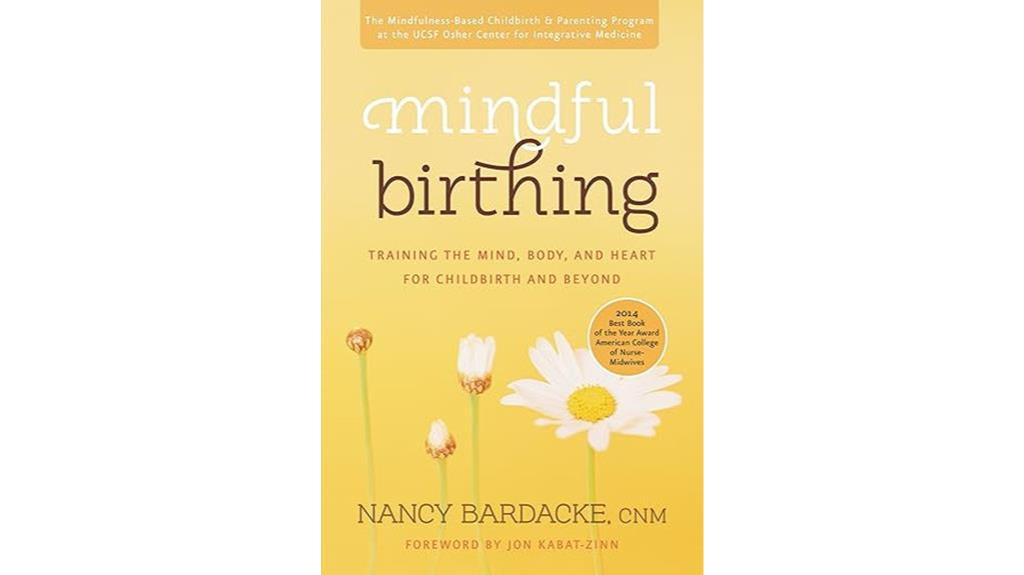
Readers seeking a thorough guide to incorporating mindfulness practices into their childbirth experience and beyond will find 'Mindful Birthing' a valuable resource.
This book has been praised for its ability to ease worries about childbirth and provide practical tools for labor and delivery. Many readers appreciated the holistic approach that 'Mindful Birthing' offers, finding the mindfulness techniques helpful in staying calm and in control during the birth process.
The non-judgmental stance of the book has also been well-received by individuals with different birth experiences. Highly recommended for expecting mothers and their partners, 'Mindful Birthing' has been found beneficial for various types of births, including medication-free births and VBACs.
Additionally, the book includes postpartum mindfulness techniques to help parents stay present and manage stress during the challenging early months of parenthood.
Best For: Expecting mothers and their partners seeking a mindful approach to childbirth and wanting practical tools for labor and delivery.
Pros:
- Provides practical tools for labor and delivery.
- Offers mindfulness techniques to stay calm and in control during childbirth.
- Includes postpartum mindfulness techniques for managing stress in the early months of parenthood.
Cons:
- May not resonate with individuals who prefer traditional childbirth approaches.
- Some readers may find the mindfulness techniques challenging to incorporate into their routine.
- The book's non-judgmental approach may not appeal to those seeking more prescriptive guidance.
The Natural Baby Sleep Solution

In addition to the practical approach offered by 'Natural Parenting Books for Parents' in improving infant sleep patterns through 'The Natural Baby Sleep Solution', this book has garnered positive testimonials. Parents have reported significant improvements in their baby's sleep routines, with some highlighting how the book helped a 10-month-old achieve uninterrupted sleep and reduced night awakenings.
The program's effectiveness was noticeable within just a few days of implementation, indicating quick results for sleep-deprived parents. Additionally, the book provides evidence-based information and valuable insights into recognizing signs of tiredness in babies, aiding in establishing better sleep habits.
While some feedback suggests a lack of tips for older infants, overall, the book's realistic expectations and user-friendly approach make it a valuable resource for parents seeking to enhance their baby's sleep quality.
Best For: Parents seeking evidence-based and practical guidance to improve their baby's sleep patterns efficiently.
Pros:
- Evidence-based information and clear insights for recognizing baby's tiredness cues.
- Quick results observed within a few days of implementing the program.
- Positive testimonials and recommendations from parents highlighting improved sleep quality.
Cons:
- Lack of practical tips specifically tailored for older babies.
- Realistic expectations may not fully address all sleep issues for every infant.
- Could benefit from more comprehensive guidance on sleep training techniques.
Nurture: A Modern Guide to Pregnancy, Birth, Early Motherhood
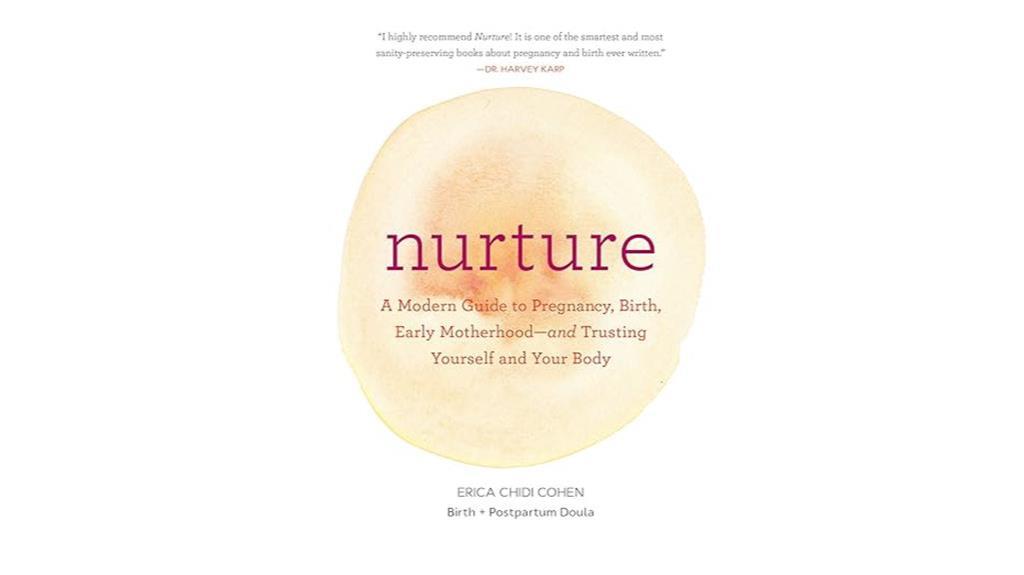
With its focus on holistic and natural birthing practices, 'Nurture: A Modern Guide to Pregnancy, Birth, Early Motherhood' is a valuable resource for expectant mothers seeking empowering and detailed information. The book encompasses various aspects of pregnancy, labor, birth, and postpartum care, offering thorough content ranging from baby development and body changes to breastfeeding and birth plans.
It provides practical advice on holistic birthing practices and includes month-by-month chapters addressing nutrition, exercises, and mental well-being. 'Nurture' also adds a personal touch by guiding readers through the emotional journey of pregnancy, encouraging trust in instincts, and offering relaxation techniques.
Despite some criticisms of basic or outdated information, the book remains educational, informative, and supportive, making it a beneficial read for expecting mothers looking for a blend of science and emotional support.
Best For: Expectant mothers who value holistic and natural birthing practices and seek a comprehensive guide for pregnancy, labor, and early motherhood.
Pros:
- Comprehensive coverage from pregnancy to postpartum, including baby development and birth plans.
- Personalized emotional support and encouragement for trusting instincts.
- Practical advice on holistic birthing practices and month-by-month guidance for well-being.
Cons:
- Some may find the information basic or outdated.
- Not universally applicable due to cultural differences.
- Mixed reviews on the scientific accuracy of the content.
Ina Mays Guide to Childbirth Updated With New Material
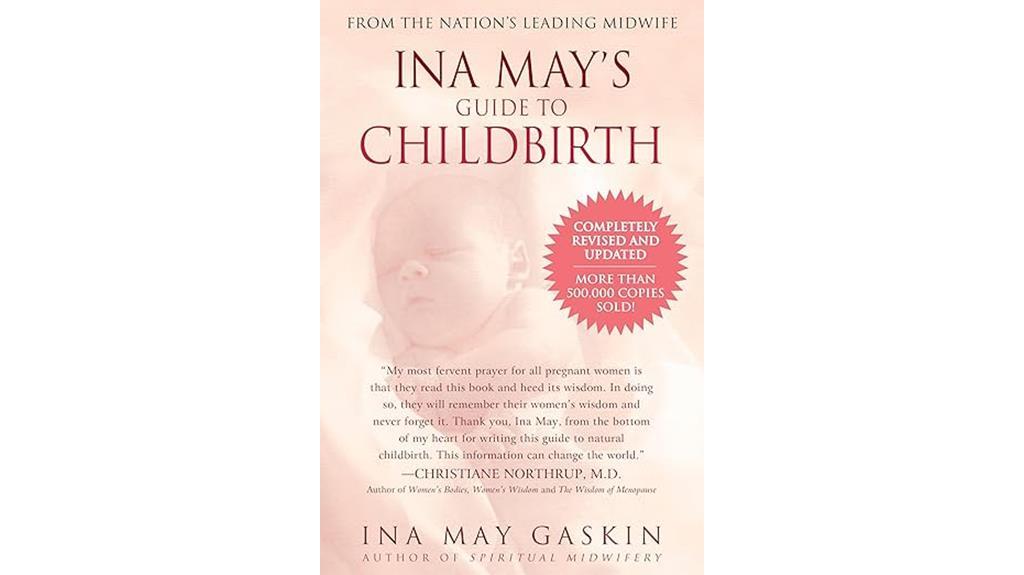
For parents seeking thorough guidance on natural childbirth experiences and empowerment, 'Ina May's Guide to Childbirth' with updated material is an invaluable resource. Ina May Gaskin, a renowned midwife, provides a wealth of knowledge and inspiration in this book.
The updated version includes new material that further enhances its relevance for expecting parents. Through empowering birth stories and practical advice, the book equips readers with confidence and understanding about the childbirth process.
It emphasizes the importance of informed decision-making and advocates for the natural birthing experience while also acknowledging the potential for medical interventions. Whether you're a first-time parent or looking to enhance your childbirth knowledge, 'Ina May's Guide to Childbirth' offers a detailed and insightful perspective that can positively impact your journey into parenthood.
Best For: Expecting parents seeking empowering birth stories, practical advice, and a deeper understanding of natural childbirth.
Pros:
- Provides empowering birth stories and practical advice.
- Equips readers with confidence and understanding about the childbirth process.
- Advocates for informed decision-making and natural birthing experiences.
Cons:
- May not fully address the complexity of medical interventions during childbirth.
- Some readers may find the emphasis on natural birth limiting in certain situations.
- Personal experiences shared may not resonate with all readers.
Breastfeeding Made Simple: Seven Natural Laws for Nursing Mothers
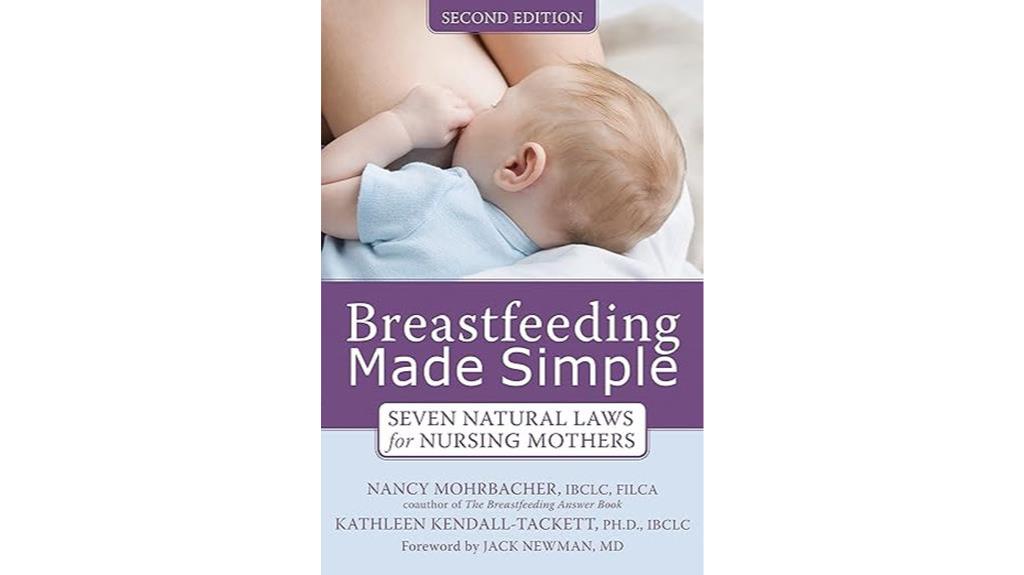
The book 'Breastfeeding Made Simple: Seven Natural Laws for Nursing Mothers' serves as an invaluable resource for first-time breastfeeding mothers looking for practical guidance and support. It offers a thorough guide to help mothers navigate the challenges and joys of breastfeeding.
Through personal experiences shared by other mothers, the book provides reassurance and practical tips on overcoming common breastfeeding obstacles. Reading this book before giving birth can better prepare mothers for the breastfeeding journey ahead.
It emphasizes the benefits of breastfeeding, both considering cost savings and the health advantages it offers to the baby. With explanations on milk supply, latch techniques, and addressing breastfeeding issues, this book equips mothers with the knowledge needed for successful nursing.
Best For: First-time breastfeeding mothers seeking practical guidance and support for overcoming common breastfeeding challenges and achieving successful nursing.
Pros:
- Comprehensive guide offering practical tips and insights from real experiences of other mothers.
- Emphasis on the benefits of breastfeeding and cost savings associated with it.
- Structured content covering essential topics like milk supply, latch techniques, and addressing breastfeeding issues.
Cons:
- May not cater to experienced breastfeeding mothers looking for more advanced techniques or information.
- Some readers may find the content repetitive if they have already gathered similar information from other sources.
- Limited focus on specific medical conditions or complications that may arise during breastfeeding.
The Best Homemade Baby Food on the Planet
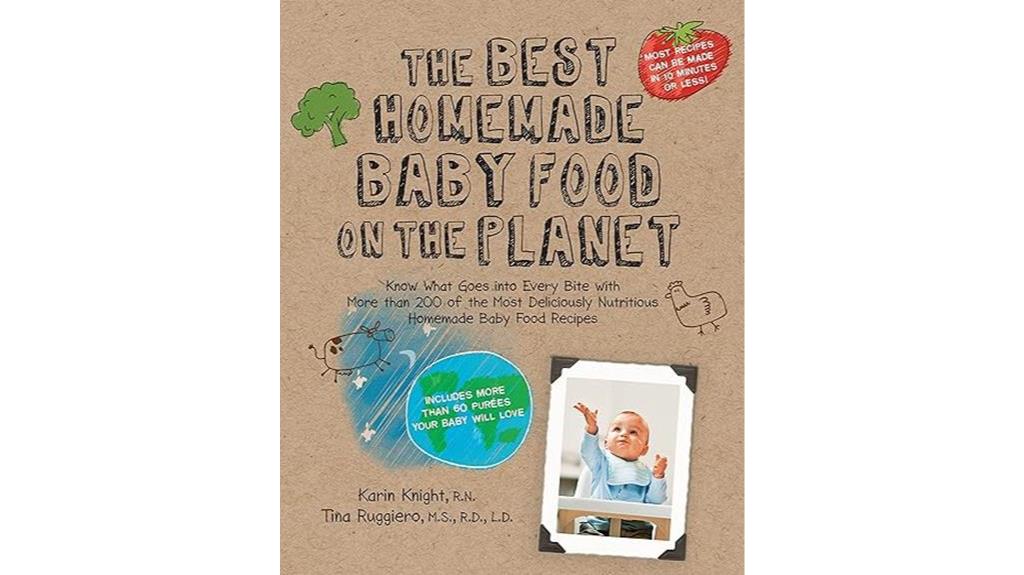
Containing a variety of creative and nutritious recipes, this book is a must-have for parents seeking to provide their babies and toddlers with wholesome homemade meals. With a clear layout and easy-to-follow instructions, it offers a range of healthy options that are quick to prepare, making mealtime a breeze for busy parents.
The incorporation of nutrient-dense foods and age-appropriate recipes guarantees that little ones receive the essential nutrition they need to thrive. Endorsed by a Registered Dietitian, this book emphasizes the significance of good nutrition for young children and provides valuable insights for parents guiding the world of homemade baby food.
From introducing foods based on age to freezer-friendly options and storage tips, this book equips parents with practical information to support their child's healthy eating journey.
Best For: Parents looking for a comprehensive guide to preparing creative and nutritious homemade meals for their babies and toddlers.
Pros:
- Well laid out with clear instructions.
- Variety of creative and healthy recipes.
- Includes practical information and tips for parents.
Cons:
- Some concerns raised about breastfeeding information.
- Desire for more diverse recipes beyond purees.
- Limited ideas catering to older babies.
Gentle Birth, Gentle Mothering: A Doctor's Guide to Natural Childbirth and Gentle Early Parenting Choices
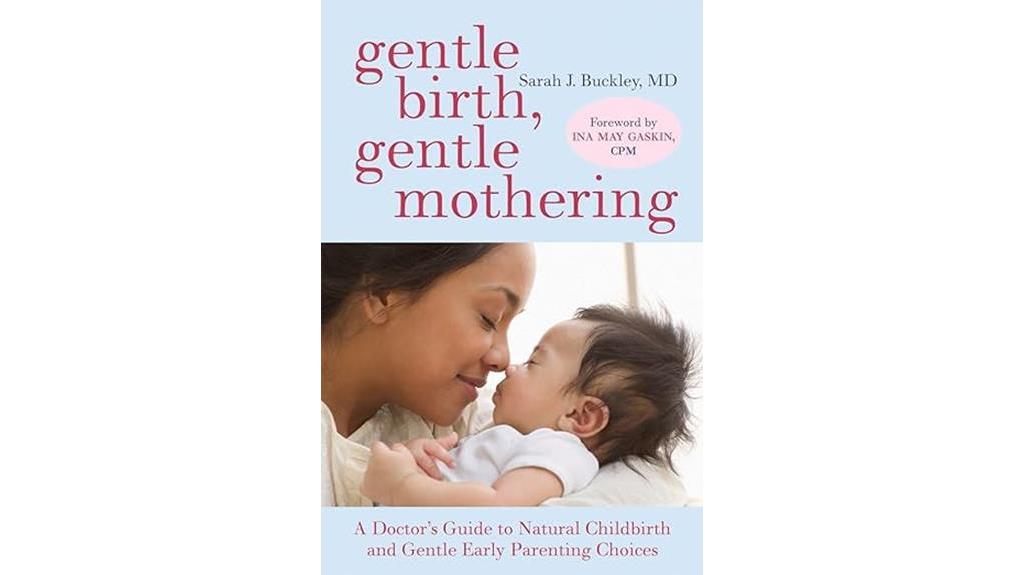
Highly recommended for those seeking evidence-based guidance on natural childbirth and early parenting choices, 'Gentle Birth, Gentle Mothering' empowers individuals to make informed decisions during their pregnancy journey.
Dr. Sarah Buckley's book advocates for undisturbed birth and gentle early parenting choices, presenting research against interventions like ultrasound and epidurals while emphasizing the benefits of skin-to-skin contact and breastfeeding.
The well-rounded mix of scientific facts and personal experiences encourages readers to explore birth options with an open mind. While some critics find the book too focused on natural birth, many appreciate the confidence it instills during labor.
Overall, 'Gentle Birth, Gentle Mothering' offers a thorough look at childbirth choices, helping readers navigate the journey with autonomy and informed decision-making.
Best For: Expectant mothers and individuals seeking evidence-based information and empowerment in natural childbirth and early parenting choices.
Pros:
- Research-based information advocating for undisturbed birth and gentle early parenting choices.
- Emphasis on benefits of skin-to-skin contact, co-sleeping, and breastfeeding supported by scientific evidence.
- Encourages informed decision-making in childbirth with a blend of personal experiences and research.
Cons:
- Some readers may find the book's emphasis on natural birth overwhelming or biased.
- Criticisms include a perceived negativity towards medical interventions rather than a balanced view.
- The book may trigger defensiveness or fear of medical interventions for some readers.
Smart Medicine for a Healthier Child
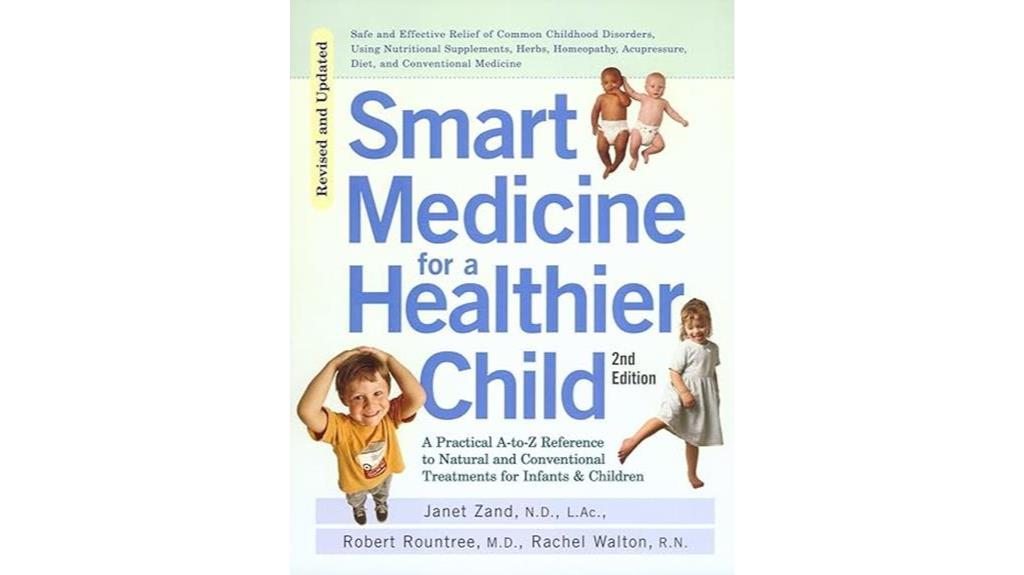
For parents seeking a thorough guide to childhood health remedies, 'Smart Medicine for a Healthier Child' is an invaluable resource. This book offers detailed information on a wide range of treatments for childhood maladies, providing parents with a thorough, effective, and helpful approach to managing their child's health.
It covers allopathic, herbal, homeopathic, and natural remedies in an easy-to-reference alphabetical layout. With a section dedicated to when to call the doctor, it offers valuable guidance in emergency situations. Users praise its extensive approach, practicality, and usefulness in addressing common and uncommon childhood illnesses.
Recommended by parents, birth assistants, and doulas, this book's versatility in providing nutritional, homeopathic, and herbal suggestions makes it a must-have for all parents looking to empower themselves in their child's health management.
Best For: Parents and caregivers looking for a comprehensive guide to managing their child's health through a variety of treatment options.
Pros:
- Provides detailed information on allopathic, herbal, homeopathic, and natural remedies.
- Alphabetical layout for easy reference.
- Includes guidance on when to seek medical help in emergency situations.
Cons:
- May be overwhelming for some users due to the extensive information provided.
- Could benefit from more specific dosage and administration guidelines.
- Limited focus on preventive measures for maintaining children's health.
Thriving with ADHD: A Guide to Naturally Reducing ADHD Symptoms in Your Child
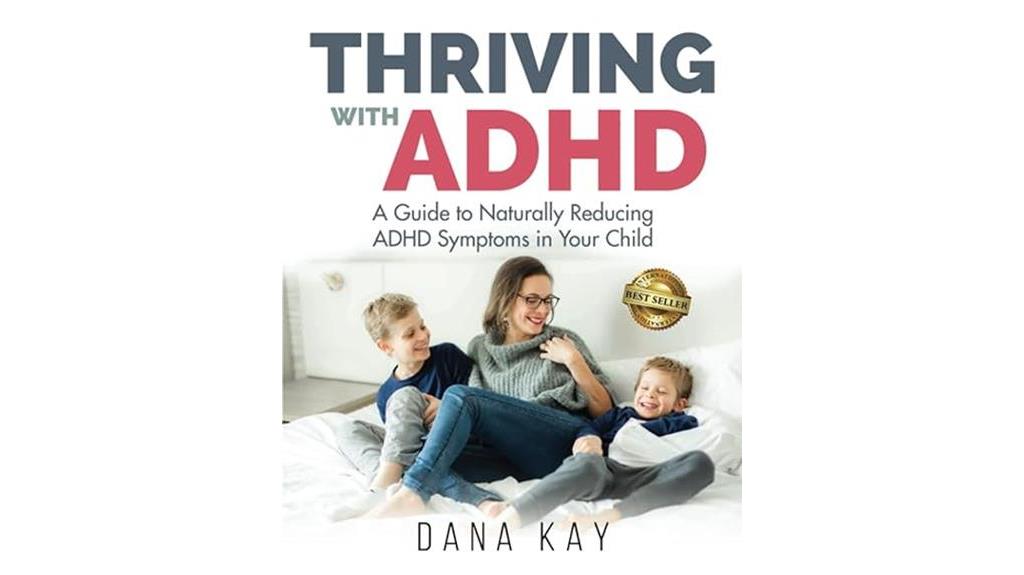
The guide 'Thriving with ADHD: A Guide to Naturally Reducing ADHD Symptoms in Your Child' is a valuable resource for parents seeking holistic strategies to support their child's well-being. Parents who've used the book found it practical, easy to follow, and filled with actionable steps. It serves as an excellent starting point for implementing natural approaches to address ADHD symptoms in children.
The book's holistic perspective, including advice on dietary and lifestyle changes, has been well-received by testimonials. Professionals, like integrative medicine physicians, have praised the impactful solutions presented in the book, emphasizing the importance of finding lasting remedies for children with challenging behaviors.
Readers appreciate the alternative treatment options beyond medication, finding hope in the possibility of their children thriving through healthy and natural methods. The book offers gratitude and inspiration, making it a recommended read for parents looking to understand and address ADHD symptoms from a holistic viewpoint.
Best For: Parents seeking natural and holistic strategies to help their children manage ADHD symptoms effectively.
Pros:
- Practical, easy-to-understand guide with actionable steps.
- Offers holistic approach including dietary and lifestyle recommendations.
- Provides hope and inspiration for parents looking for alternative treatments beyond medication.
Cons:
- May require significant time and effort to implement dietary and lifestyle changes.
- Individual results may vary in terms of symptom improvement.
- Some readers may prefer more in-depth scientific explanations on the strategies suggested.
The Simplest Pregnancy Book in the World
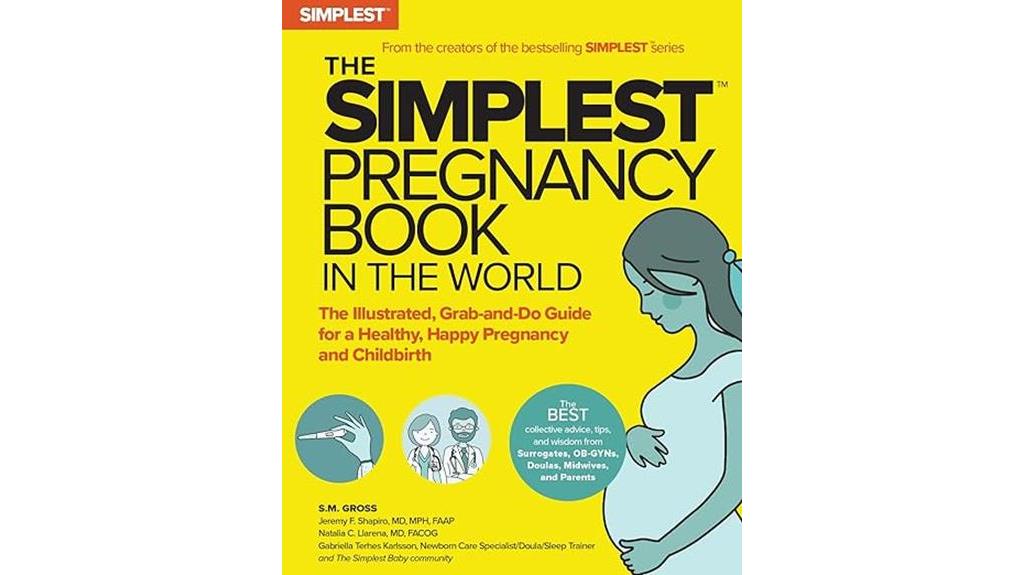
With its practical and informative approach, 'The Simplest Pregnancy Book in the World' is a must-have for expectant moms seeking a straightforward guide to pregnancy and childbirth. This book has garnered positive reviews for its ability to ease fears and provide answers to common questions expectant mothers may have.
It covers a wide range of topics related to pregnancy and childbirth, helping readers prepare for labor and find suitable resources. The information presented is detailed yet concise, making it easy to traverse and understand.
Whether you're a first-time mom or experienced in parenthood, this book offers honest facts, helpful hacks, and practical tips for each trimester and post-birth care. Written in a simple and accessible manner, 'The Simplest Pregnancy Book in the World' is organized for easy reading, making it a valuable resource for journeying through the experience of pregnancy and parenthood.
Best For: First-time and experienced moms looking for a practical and informative guide to pregnancy and childbirth.
Pros:
- Practical, simple, and informative approach.
- Eases fears and answers common questions for expectant moms.
- Useful information presented in a detailed yet concise manner.
Cons:
- May lack in-depth coverage on certain specific topics.
- Some readers may prefer more visual aids or illustrations.
- Limited focus on postpartum mental health and emotional well-being.
Factors to Consider When Choosing Natural Parenting Books

When selecting natural parenting books, it's crucial to take into account criteria such as the author's credibility, the relevance of the content to your parenting style, and the inclusion of practical tips.
Ensuring the book balances modern practices with natural approaches can provide a well-rounded perspective on parenting techniques.
Criteria for Selecting Books
Consideration of the author's credentials and expertise in natural parenting is essential when selecting books on the subject. Making sure that the author has a solid background in natural parenting practices can help guarantee that the information provided is reliable and trustworthy.
Look for books that not only offer practical tips but also present evidence-based research and actionable advice for implementing natural parenting methods effectively. It's beneficial to choose a book that covers a wide range of topics related to pregnancy, childbirth, breastfeeding, and child development to get a thorough understanding of natural parenting.
Additionally, prioritize books that align with your parenting philosophy and values to ensure that the content resonates with your approach. Selecting a book that provides guidance on incorporating natural remedies, holistic practices, and healthy lifestyle choices for raising children can further support your natural parenting journey.
Author Credibility Importance
To ensure the reliability and trustworthiness of information in natural parenting books, it's essential to carefully assess the credibility of the authors behind the content.
When selecting a natural parenting book, consider authors with backgrounds in fields like pediatrics, child psychology, nutrition, or holistic health. Authors who are experienced practitioners, researchers, or educators in natural parenting can offer valuable insights and evidence-based advice.
Look for authors with a strong reputation in the natural parenting community or those who've published well-regarded works in the field. Checking for endorsements, reviews, or recommendations from reputable sources or experts in natural parenting can help gauge the author's credibility.
Authors with relevant qualifications, experience, and expertise in natural parenting increase the credibility of the content they provide. Additionally, authors who've conducted research, published studies, or have a background in child development are more likely to offer valuable insights in their books.
Consider the author's reputation and track record in the natural parenting space to align their perspectives with your values and beliefs.
Relevance to Parenting Style
Understanding how a natural parenting book resonates with my personal parenting philosophy and values is vital when selecting reading material for guidance and insights. It's essential to assess whether the book aligns with my parenting style, whether it's attachment parenting, gentle parenting, or holistic parenting.
By choosing a book that mirrors my approach, I can better integrate the strategies and techniques suggested within its pages. Additionally, evaluating if the book addresses specific challenges I face in my parenting journey is paramount. It's important to make sure that the book's natural parenting approach is evidence-based and backed by research, providing a solid foundation for its recommendations.
Selecting a book that offers practical advice and strategies that can be easily implemented into my daily routines is advantageous. By focusing on my parenting style, concerns, and interests, I can find a natural parenting book that resonates with me and provides valuable insights tailored to my individual needs.
Inclusion of Practical Tips
How can natural parenting books enrich my journey as a parent by providing practical tips for implementing holistic parenting practices effectively and efficiently?
Natural parenting books offer valuable insights into incorporating holistic parenting methods into daily routines. When choosing a book, look for practical tips on breastfeeding, babywearing, natural remedies, and more. Seek step-by-step guidance on creating natural birth plans, making baby food, and practicing mindfulness techniques.
Opt for books with hands-on activities to help you apply these methods in real-life situations. It's beneficial to have real-life examples and case studies to understand how these practices work in different scenarios. Additionally, books should provide resources and references for further exploration. Practical advice supported by scientific evidence ensures safety and effectiveness.
Choose books with manageable tips that suit your busy lifestyle. By incorporating practical tips from natural parenting books, you can navigate the challenges of holistic parenting with confidence and ease.
Balancing Modern Practices
When selecting natural parenting books, it's important to examine how they strike a balance between modern medical practices and traditional or holistic approaches. Look for books that offer a well-rounded view of modern parenting challenges while advocating for natural solutions.
Consider how the books address the integration of modern technology and natural parenting methods. Evaluate if the books provide evidence-based information on the effectiveness of natural parenting techniques in a modern context. Assess whether the books offer practical tips and strategies for incorporating natural parenting principles into a modern lifestyle.
Also, consider how the book balances modern parenting practices with natural and holistic approaches. Look for information on integrating traditional wisdom with contemporary research and recommendations. Evaluate the book's approach to incorporating modern tools and technologies while staying true to natural parenting principles.
Check if the book addresses the challenges of navigating modern lifestyles while prioritizing natural and sustainable parenting choices. Make sure the book offers practical tips and strategies for implementing natural parenting in a modern world.
Research-Backed Information
To make informed choices when selecting natural parenting books, consider prioritizing those that present research-backed information supported by scientific studies and evidence. Look for books that cite reputable sources and studies to guarantee the information provided is reliable and accurate.
It's crucial to choose books that offer a balanced view of natural parenting methods, incorporating both traditional wisdom and modern research findings. Books that emphasize evidence-based practices and recommendations for raising children in a healthy and holistic manner can provide valuable insights.
Additionally, seek out books that emphasize the importance of informed decision-making based on scientific evidence when it comes to natural parenting choices. By selecting books that provide evidence-based information supported by scientific research on natural parenting practices, you can equip yourself with the knowledge needed to make informed decisions for your child's well-being.
Prioritizing research-backed information can help you navigate the vast array of natural parenting advice available and choose strategies based on proven research.
User-Friendly Layout
Consider selecting natural parenting books that feature a user-friendly layout, incorporating clear headings, bullet points, and diagrams to enhance comprehension and ease of navigation. A well-organized book can make it easier to find information quickly and follow the content effectively.
Look for books that break down complex concepts into manageable sections, offering a structured and organized reading experience. Check for clear headings and subheadings that guide you through the content seamlessly.
Opt for books with a consistent format, using bullet points, lists, and summaries to aid in understanding and retention of information. Additionally, a visually appealing layout with illustrations, charts, and diagrams can enhance your comprehension of challenging topics.
Make sure the book includes a table of contents, index, and glossary for easy access to specific topics and terms. By choosing a natural parenting book with a user-friendly layout, you can enhance your reading experience and benefit from a well-structured resource.
Engaging Visual Elements
Exploring natural parenting books involves seeking out those that incorporate engaging visual elements to enhance understanding and retention of information. Visual aids like illustrations, diagrams, and charts play an important role in simplifying complex concepts, making them more accessible and enjoyable to learn.
For instance, illustrations depicting parenting techniques or exercises can clarify instructions, aiding in easier implementation. Additionally, visual representations of data and statistics help readers grasp key points effectively, enabling them to make informed decisions. Books with visually appealing layouts and designs not only enhance the reading experience but also keep readers engaged throughout the content.
Colorful and well-designed graphics not only make the information more appealing but also aid in retention. By breaking up text-heavy sections and incorporating photographs and infographics, natural parenting books cater to various learning styles, ensuring active engagement with the content. Essentially, engaging visual elements are essential in making natural parenting books informative, interactive, and visually stimulating.
Frequently Asked Questions
Can Natural Parenting Books Help With ADHD Symptoms in Children?
Yes, natural parenting books can provide strategies and insights on supporting children with ADHD symptoms. These books often offer holistic approaches, such as nutrition, mindfulness, and positive discipline techniques, which can complement traditional treatment methods.
Understanding how lifestyle factors can impact ADHD symptoms may help parents better navigate their child's challenges. While not a replacement for professional medical advice, these resources can be valuable tools in managing ADHD in children.
How Can I Choose the Best Natural Parenting Book for My Family?
To choose the best natural parenting book for my family, I consider our specific needs and values. Researching authors and their expertise in natural parenting is essential. Reading reviews from other parents can provide valuable insights.
I also look for books that align with my parenting style and goals. Checking for up-to-date information and practical advice guarantees relevance.
Ultimately, selecting a book that resonates with me personally is key to finding the best fit for my family.
What Are Some Key Factors to Consider When Selecting a Natural Parenting Book?
When choosing a natural parenting book, consider the author's credentials, ensuring they have expertise in child development.
Look for a book that aligns with your parenting philosophy and addresses your specific concerns.
Check reviews for insights on readability and practicality.
Assess the book's organization and layout to see if it suits your learning style.
Lastly, opt for updated editions to access the latest research and recommendations.
These factors can guide you to the right natural parenting book for your family.
Do These Books Address Common Breastfeeding Challenges for New Mothers?
When it comes to addressing common breastfeeding challenges for new mothers, natural parenting books often provide valuable insights and practical tips.
These books typically cover topics such as latching issues, low milk supply, engorgement, and mastitis. They offer guidance on proper breastfeeding techniques, troubleshooting problems, and seeking professional support when needed.
Are There Specific Tips for Promoting Natural Sleep Solutions for Babies?
When it comes to promoting natural sleep solutions for babies, establishing a consistent bedtime routine can work wonders.
Incorporating soothing activities like gentle massages or lullabies can signal to your little one that it's time to wind down.
Additionally, creating a calm sleep environment with minimal distractions can help encourage peaceful slumber.
Are Natural Parenting Techniques Suitable for Raising Tweens?
Many parents find it challenging to navigate the tween years. Fortunately, there are numerous best parenting books for tweens that offer valuable insights into natural parenting techniques. By incorporating gentle discipline and open communication, parents can create a supportive and nurturing environment for their tweens to thrive.
Conclusion
As you explore the world of natural parenting, let these books be your guiding light, illuminating the path with wisdom and knowledge.
With each exploration of the page, you'll find yourself empowered to nurture your child with love and intention, creating a bond that will last a lifetime.
So immerse yourself in these insightful reads, and watch as your journey as a parent blossoms into something truly beautiful and fulfilling.
Vetted
15 Best Mindful Parenting Books Every Parent Should Read
Kickstart your mindful parenting journey with these 15 essential books, offering insights and strategies to navigate the challenges of raising children with mindfulness.

**Exploring** mindful parenting books really **boosts** your parenting journey. Must-reads include **”Raising Good Humans”**, which helps you ditch reactive habits, **”Mindful Birthing”**, offering a whole mind-body birth method, and **”Being at Your Best When Your Kids Are at Their Worst”**, packed with practical compassion tips. **”Parenting at Your Best”** shares amazing insights. When choosing from the many options, consider content and how engaging they are. These books give priceless strategies to grow a mindful parenting style.
Key Takeaways
- "Raising Good Humans" offers practical advice for mindful parenting.
- "Mindful Discipline" emphasizes emotional intelligence in parenting.
- "Mindful Birthing" focuses on training the mind, body, and heart.
- "Growing Up Mindful" provides insights on raising mindful children.
- "Parenting from the Inside Out" explores self-understanding in raising thriving kids.
Raising Good Humans: A Mindful Guide to Breaking the Cycle of Reactive Parenting
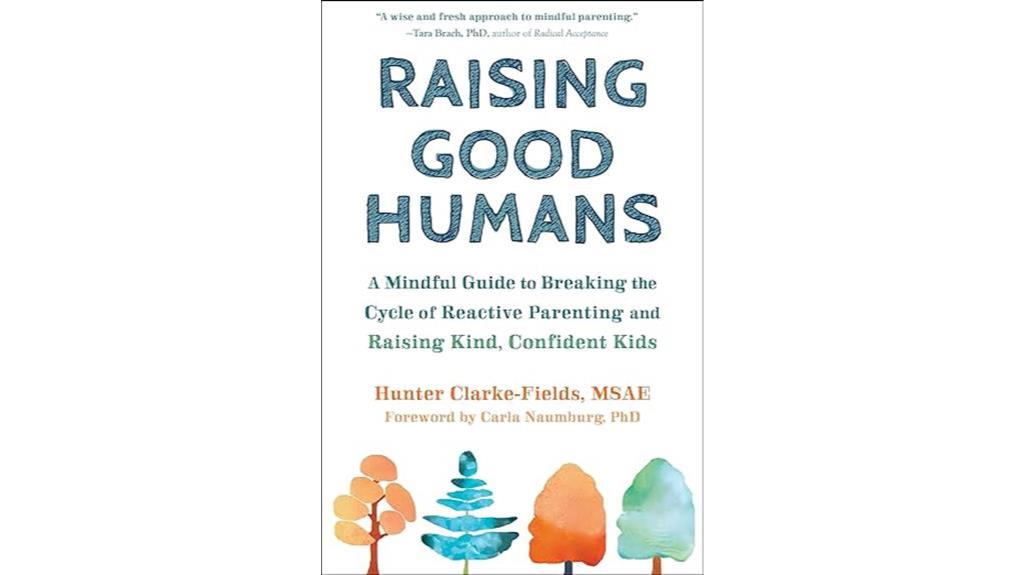
For those seeking insightful guidance on breaking the cycle of reactive parenting and fostering mindful relationships with their children, 'Raising Good Humans' is an invaluable resource. This book has received positive reviews and recommendations for its engaging and helpful approach, making it a must-read for all parents, especially first-timers.
Readers highlight the importance of self-work and patience in parenting, showing how this book can positively impact one's parenting style. Many readers mention how the strategies provided in 'Raising Good Humans' have helped them navigate challenging moments with their children, ultimately leading to more confident kids.
Despite some challenges in unlearning past parenting habits, the emphasis on self-work and mindfulness practices in this book has proven to be transformative for many.
Best For: Parents looking to break the cycle of reactive parenting and develop mindful relationships with their children.
Pros:
- Insightful guidance for improving parenting skills.
- Valuable strategies for handling difficult moments with children.
- Emphasis on self-work and mindfulness practices for personal growth.
Cons:
- Some readers may find it challenging to unlearn past parenting habits.
- Initial difficulty in approaching mindfulness practices for a few readers.
- Requires consistent effort and self-reflection, which may be demanding for some.
Mindful Parenting for ADHD Guide
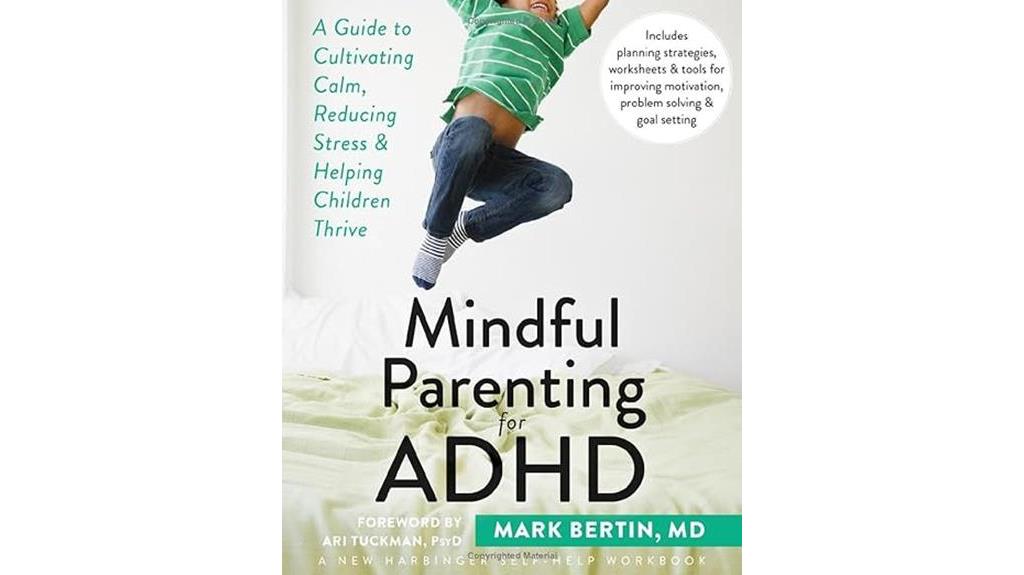
The 'Mindful Parenting for ADHD' guide is an invaluable resource recommended for parents managing the challenges of raising children with ADHD. This book offers a unique and practical approach, providing insightful advice alongside worksheets and action plans.
It covers essential topics such as organization techniques, homework plans, and academic support, emphasizing the importance of aiding children with ADHD in their learning journey. Medical professionals regard it as groundbreaking, contributing to a better understanding of ADHD as a developmental brain delay.
The book also focuses on practical guidance, offering easy-to-follow suggestions for effective parenting skills and communication strategies. By integrating mindfulness practices, it helps parents become more mindful individuals, fostering calm, improved focus, self-regulation, and compassion in handling the complexities of raising children with ADHD.
Best For: Parents of children with ADHD seeking practical guidance and support in mindful parenting techniques.
Pros:
- Comprehensive advice and worksheets for organization and academic support.
- Integration of mindfulness practices for improved focus and compassion.
- Easy-to-follow suggestions for effective parenting skills and communication strategies.
Cons:
- May require consistent practice and dedication to see significant results.
- Not all strategies may work for every child with ADHD.
- Additional support or resources may be needed for more complex cases.
Mindful Birthing: Training the Mind, Body, and Heart for Childbirth and Beyond
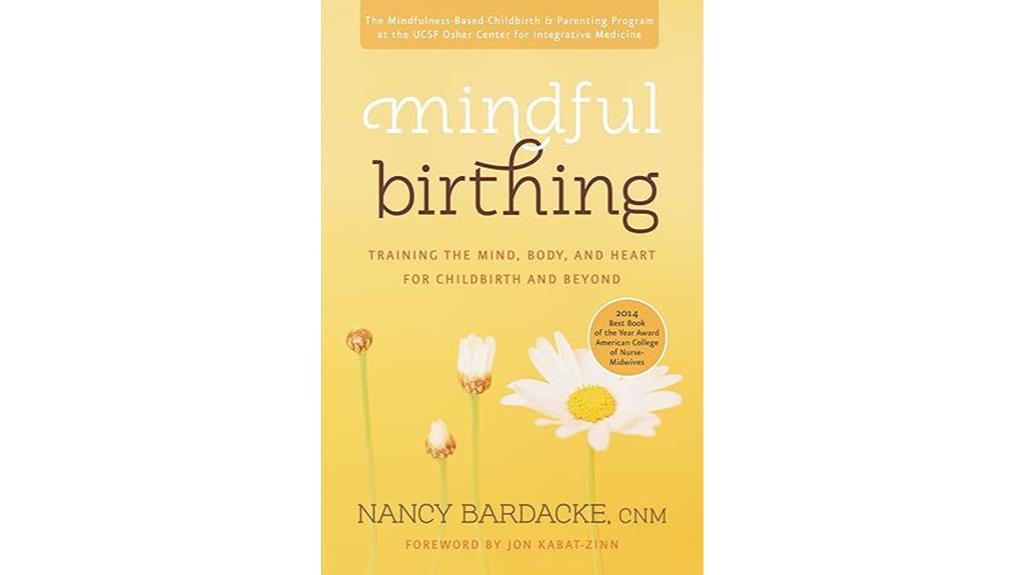
Ideal for expecting parents seeking a holistic approach to childbirth and mindfulness techniques, 'Mindful Birthing' provides valuable tools for managing the birthing experience and beyond. This book has been praised for easing worries surrounding childbirth and offering practical strategies for labor and delivery.
Readers appreciated the non-judgmental approach and found the mindfulness techniques instrumental in staying calm and composed during birth. 'Mindful Birthing' comes highly recommended for expecting mothers and their partners, with many highlighting its effectiveness for various types of births, including medication-free deliveries and VBACs.
Additionally, the book includes guidance on postpartum mindfulness, aiding readers in staying present and managing stress during the initial months of parenting. With positive feedback on its impact on birth experiences, 'Mindful Birthing' is a valuable resource for those seeking a mindful approach to childbirth and beyond.
Best For: Expecting parents looking for a comprehensive guide to mindfulness techniques and holistic approaches to childbirth and parenting.
Pros:
- Offers practical tools and strategies for managing the birthing experience.
- Non-judgmental approach appreciated by readers with different birth experiences.
- Includes guidance on postpartum mindfulness to assist in staying present and reducing stress during early parenting.
Cons:
- Some readers may find the mindfulness techniques challenging to implement consistently.
- May not cater to individuals who prefer a more traditional, medical-focused approach to childbirth.
- Limited focus on specific medical interventions or complications that may arise during childbirth.
Mindful Parenting for ADHD Children
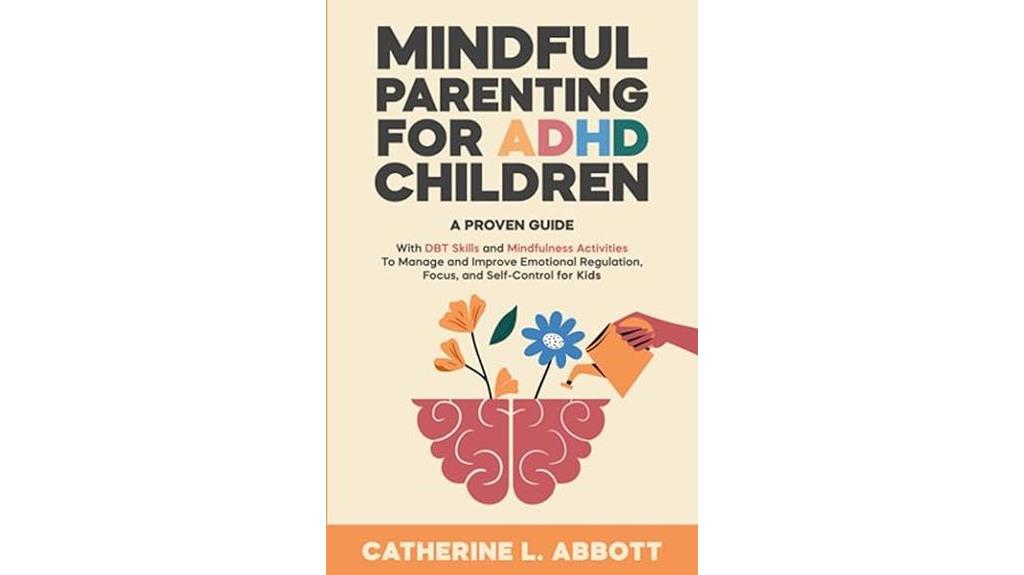
Ideal for parents seeking practical strategies to support children with ADHD, Mindful Parenting Books offer valuable insights and coping mechanisms. These books provide a holistic understanding of ADHD, covering symptoms, causes, and diagnosis. They equip parents with practical tools such as DBT skills and mindfulness activities to help children manage emotional regulation, focus, and self-control effectively.
Readers recommend these books not only for parents but also for foster parents, teachers, and individuals working with children dealing with ADHD. Personal experiences shared by readers highlight how these books have helped them navigate the challenges of raising children with ADHD, offering practical strategies and valuable coping mechanisms.
By promoting self-awareness, self-control, effective communication, and nurturing environments, Mindful Parenting Books play a significant role in fostering harmonious relationships between parents and children with ADHD.
Best For: Parents, foster parents, teachers, and individuals working with children with ADHD seeking practical tools and insights to support emotional regulation and self-control.
Pros:
- Comprehensive understanding of ADHD, including symptoms, causes, and diagnosis.
- Practical tools like DBT skills and mindfulness activities for managing emotional regulation and focus in children with ADHD.
- Empowers parents to create a nurturing environment fostering self-awareness and self-control in children with ADHD.
Cons:
- Subjective nature of content may not resonate with all readers.
- Similar strategies may be available online for free, raising concerns about the book's unique value.
- Some readers may find the content repetitive or lacking in depth in certain areas.
Mindful Parenting Book
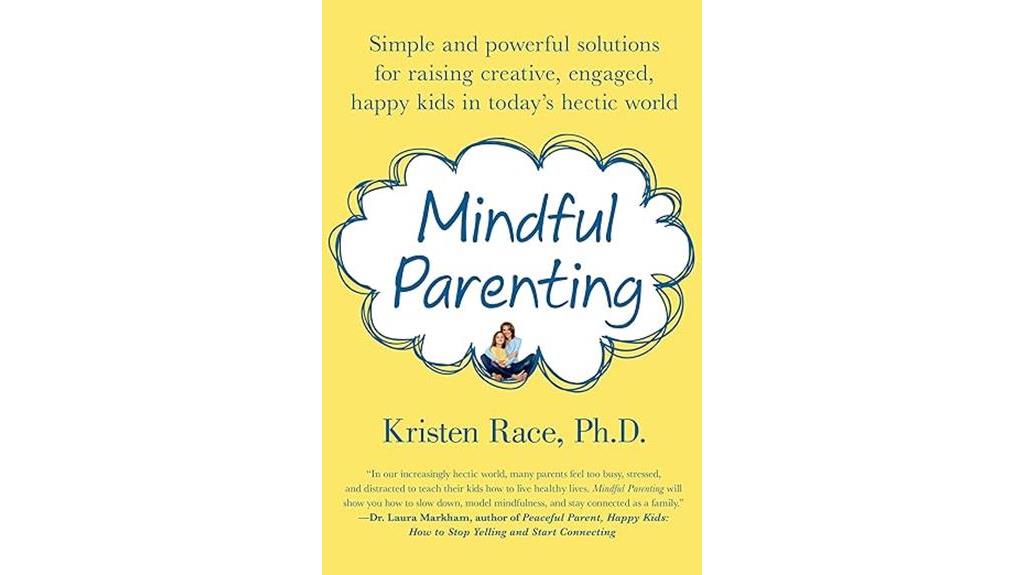
For parents seeking practical and science-backed strategies to explore mindfulness in their parenting approach, this book offers valuable insights and actionable advice. With numerous positive reviews praising its eye-opening content and practicality, this book seems to resonate with a wide range of readers.
It not only delves into understanding why children react the way they do but also provides tips for managing stress and improving mindfulness. Backed by scientific evidence, each chapter offers a blend of research-based information and mindfulness techniques, making it accessible even to those unfamiliar with complex biological concepts.
The book's practical suggestions and easy application have garnered recommendations from various readers, highlighting its global relevance beyond just American audiences. Whether you're a parent, grandparent, or anyone working with children, this book seems to offer a detailed guide to incorporating mindfulness into your parenting journey.
Best For: Parents and caregivers looking for practical, science-backed strategies to integrate mindfulness into their parenting approach.
Pros:
- Offers valuable insights and actionable advice for understanding children's behavior and managing stress.
- Backed by scientific evidence, providing a blend of research-based information and mindfulness techniques.
- Practical suggestions and easy application make it accessible to a wide range of readers, including those unfamiliar with complex biological concepts.
Cons:
- May not delve deep enough into certain advanced parenting topics.
- Could benefit from more diverse perspectives and cultural considerations.
- Some readers may find the content repetitive or overly simplistic.
Mindful Discipline: A Loving Approach to Setting Limits and Raising an Emotionally Intelligent Child
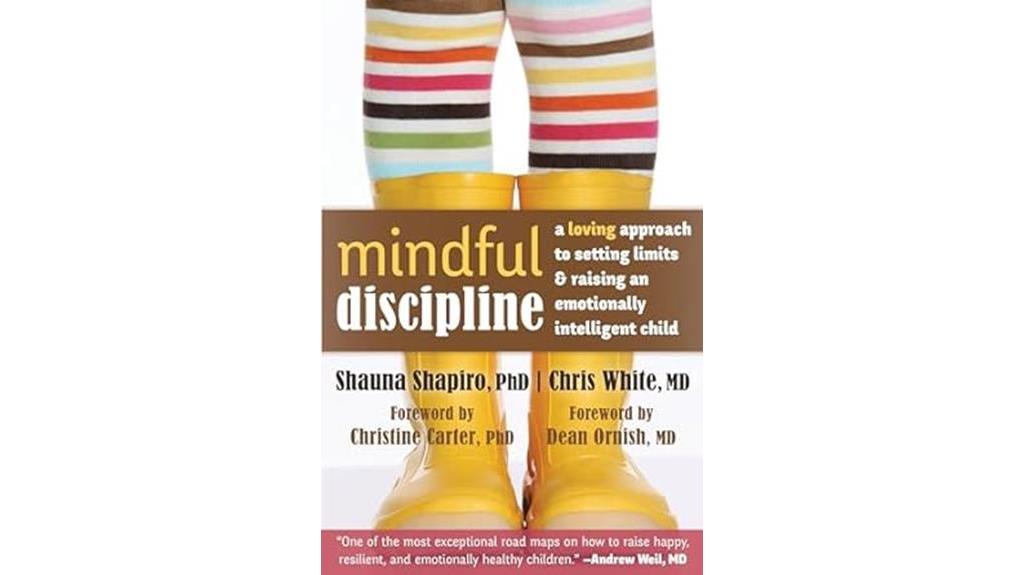
Best suited for parents seeking to incorporate mindfulness and loving discipline in their parenting approach, 'Mindful Discipline: A Loving Approach to Setting Limits and Raising an Emotionally Intelligent Child' offers practical strategies and insights for nurturing emotionally intelligent children. The book is praised for its common-sense approach, providing readers with tangible examples to follow.
By emphasizing mindfulness and balanced discipline, it equips parents with tools to raise children who are emotionally adept. Mindfulness benefits highlighted in the book include improved emotional regulation and resilience for both parents and children.
Readers appreciate the easy-to-implement strategies for setting boundaries and fostering a harmonious home environment. Though some desire more hands-on tips, the academic foundation of the book ensures a well-balanced and science-based approach to mindful parenting.
Best For: Parents looking to incorporate mindfulness and loving discipline in their parenting approach to raise emotionally intelligent children.
Pros:
- Practical strategies and tangible examples provided for nurturing emotionally intelligent children.
- Emphasis on mindfulness and balanced discipline to equip parents with effective tools.
- Easy-to-implement strategies for setting boundaries and fostering a harmonious home environment.
Cons:
- Some readers desire more hands-on tips and examples.
- Need for alternative strategies if initial suggestions do not work smoothly.
- Lack of practical advice and examples may leave some readers feeling the book falls short of expectations.
Parenting from the Inside Out: How a Deeper Self-Understanding Can Help You Raise Children Who Thrive

With its focus on deeper self-understanding to enhance parenting skills, 'Parenting from the Inside Out' is a valuable resource for those seeking to cultivate a strong and nurturing relationship with their children.
This book explores the importance of understanding one's own past and emotions to become a better parent. By investigating how our upbringing influences our parenting style, 'Parenting from the Inside Out' offers a fresh perspective on raising children.
It emphasizes the significance of healing past wounds and developing a deeper self-awareness to create a more empathetic and understanding environment for our children to thrive.
Through personal insights from professionals and scientific references, this book provides practical tools for self-growth and fostering stronger parent-child relationships.
If you're looking to enhance your parenting skills through inner reflection and understanding, 'Parenting from the Inside Out' is a must-read.
Best For: Individuals seeking to improve their parenting skills through deeper self-understanding and healing past wounds.
Pros:
- Offers valuable insights on how personal history influences parenting style.
- Provides practical tools and exercises for self-growth and fostering better parent-child relationships.
- Backed by personal insights from professionals and referenced scientific material for a comprehensive understanding.
Cons:
- May require a significant amount of introspection and emotional work.
- Some readers might find the psychological concepts challenging to grasp initially.
- Not a quick-fix solution and requires ongoing commitment to personal growth and reflection.
Under the Chinaberry Tree: Books and Inspirations for Mindful Parenting
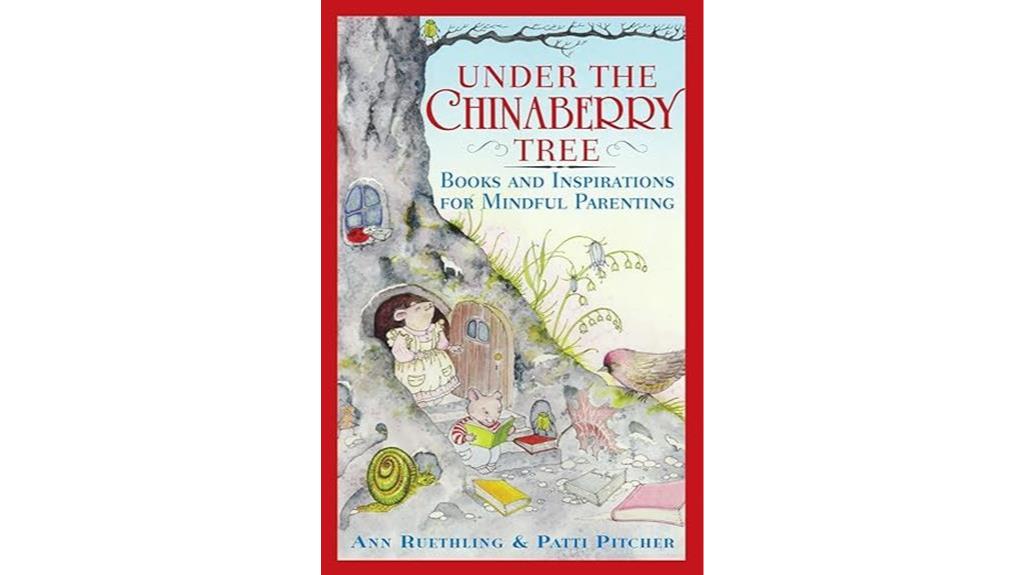
When considering books for mindful parenting, exploring 'Under the Chinaberry Tree' can provide valuable insights and inspirations for traversing the journey of raising young children. This book has garnered positive reviews for its comforting and valuable content, appreciated by fans of Chinaberry's offerings.
Ann's wisdom and humor shine through, making it a recommended read for all parents of young children. Despite some critiques about its focus on specific age groups and design elements, the book's teachings on parenting from the heart and soul have left a lasting impact on readers.
Through personal growth and a unique perspective, 'Under the Chinaberry Tree' has influenced many to become better parents. Sharing personal experiences and recommendations, this book serves as a guiding light for mindful parenting.
Best For: Parents seeking valuable insights and inspirations for mindful parenting to navigate the journey of raising young children.
Pros:
- Offers comforting and valuable content appreciated by fans of Chinaberry's offerings.
- Provides teachings on parenting from the heart and soul, impacting personal growth and perspective.
- Recommended read for all parents of young children, influencing better parenting skills.
Cons:
- Critiques regarding the focus on specific age groups in the book.
- Some children may not find recommended books appealing.
- Design elements such as detailed illustrations and the green typeface may impact engagement and readability.
Growing Up Mindful
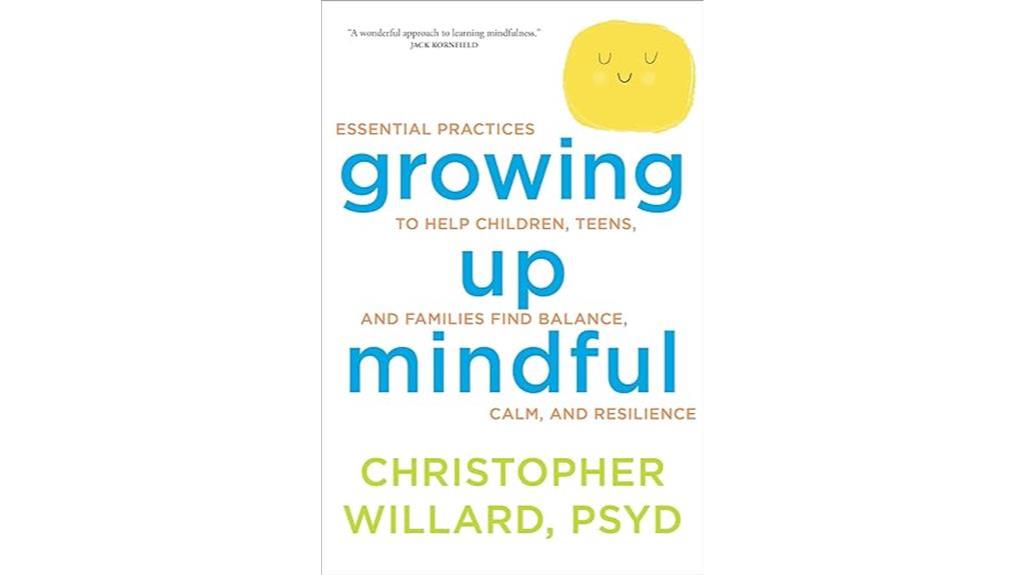
For parents, teachers, therapists, caregivers, or anyone interested in sharing mindfulness with children, 'Growing Up Mindful' offers easily implemented practices and a positive outlook on teaching mindfulness to kids. This book provides a variety of practical suggestions that are clear, easy to follow, and suitable for individuals at all experience levels.
It includes a helpful chart showcasing the positive impact of regular mindfulness practice, making it a valuable resource for those looking to introduce mindfulness into children's lives. With a writing style that's genuine and easy to understand, 'Growing Up Mindful' incorporates mindful interludes for experiential learning, enhancing the overall reading experience.
Users have praised this book as one of the best resources for teaching mindfulness to children, making it a must-have for anyone interested in incorporating mindfulness practices into their families or classrooms.
Best For: Parents, educators, therapists, and caregivers seeking a comprehensive and user-friendly guide for teaching mindfulness to children.
Pros:
- Easily implemented practices suitable for beginners and experienced individuals.
- Genuine writing style with mindful interludes for experiential learning.
- Positive impact chart showcasing the benefits of regular mindfulness practice.
Cons:
- Some users reported receiving books with stains upon arrival.
- One user recommended purchasing the physical copy over the digital version.
- Limited mention of potential challenges or obstacles in implementing mindfulness practices with children.
Practicing Mindfulness: 75 Essential Meditations to Reduce Stress, Improve Mental Health, and Find Peace
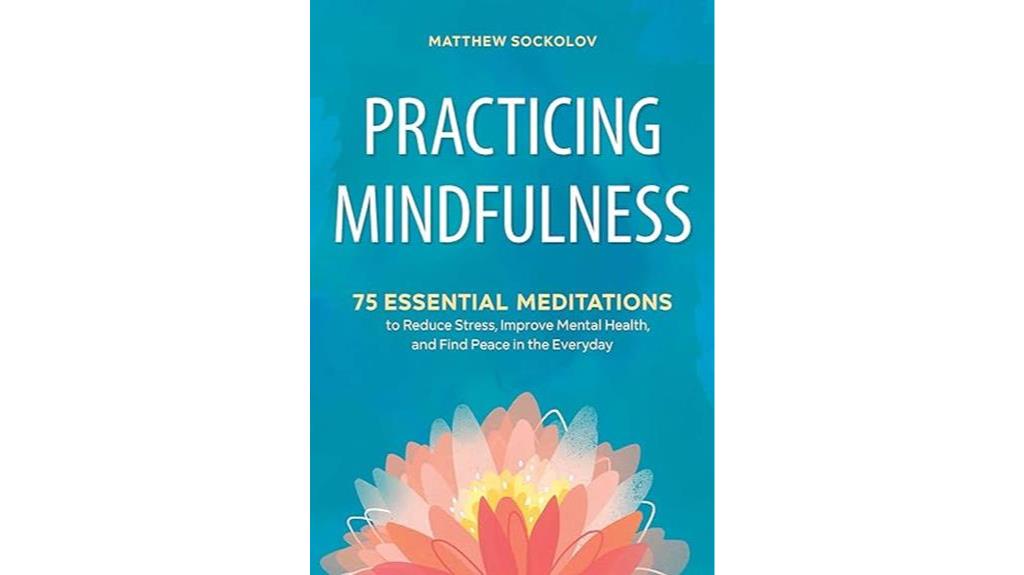
Ideal for busy parents seeking quick and effective mindfulness practices, 'Practicing Mindfulness: 75 Essential Meditations to Reduce Stress, Improve Mental Health, and Find Peace' offers accessible techniques tailored for daily use. This book by Mathew Sockolov presents a wide range of meditation approaches designed to fit into even the busiest schedules, with sessions lasting between 5 to 20 minutes.
It covers areas such as basic mindfulness exercises, everyday mindfulness, and mindful moods, making it a thorough guide for self-improvement through meditation. Readers have praised its simplicity, readability, and practicality in incorporating meditation into their daily routines.
Whether you're new to mindfulness or a seasoned practitioner, this book provides valuable resources for managing emotions and stress effectively in everyday life.
Best For: Individuals with busy schedules seeking accessible and effective mindfulness practices.
Pros:
- Offers a wide range of meditation approaches suitable for daily use.
- Simple and practical exercises that take little time to complete.
- Comprehensive guide covering various areas for self-improvement through meditation.
Cons:
- Some may find the meditation ideas presented overly simplistic.
- Content may not be deemed substantial enough for certain preferences.
- A perception of the material being more suitable for a blog post or series rather than a book.
The Book of Joy: Lasting Happiness in a Changing World
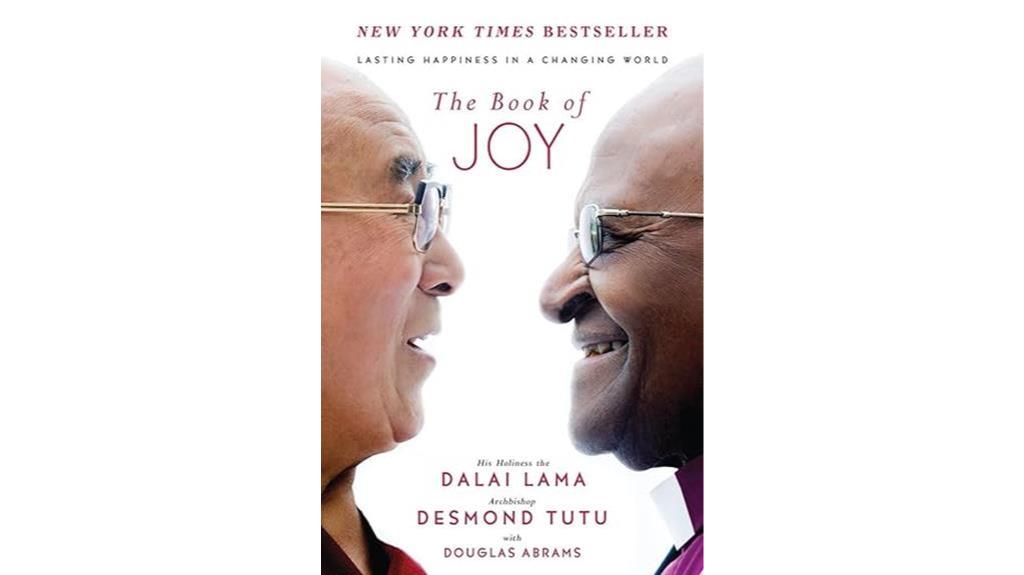
Exploring 'The Book of Joy: Lasting Happiness in a Changing World' offers valuable insights for parents seeking to cultivate compassion and empathy in their parenting journey. Published in 2016, this book documents a remarkable week-long meeting between the Dalai Lama and Archbishop Desmond Tutu, focusing on the pursuit of joy amidst life's challenges.
Divided into three parts, it covers the essence of true joy, the barriers to joy, and the pillars of joy. Delving into topics like suffering, forgiveness, and compassion, the book provides practical advice on finding happiness and maintaining mental well-being.
Readers appreciate the wisdom, humor, and depth of humanity portrayed in this book, making it a recommended read for those looking to enhance their personal growth and embrace joy in an ever-changing world.
Best For: Parents seeking to instill compassion and empathy in their parenting journey through profound insights on joy and resilience.
Pros:
- Offers practical advice on finding happiness and maintaining mental well-being.
- Delightful blend of wisdom, humor, and humanity.
- Insightful exploration of joy amidst life's challenges.
Cons:
- May require reflection and introspection, which can be time-consuming.
- Some readers may find the content emotionally intense.
- Not a quick-fix solution for immediate happiness.
Beginners Guide on Parenting Children with ADHD: Modern Approach to Understanding and Leading Hyperactive Child to Success

When seeking a practical and insightful guide on parenting children with ADHD, 'Mindful Parenting Books' stands out as a valuable resource. This book has garnered positive reviews for its helpful content and modern approach to dealing with ADHD.
While it may lack concrete suggestions on how to help kids with ADHD according to some critics, it's still praised for its clear and concise style, making it great for beginners. Some readers appreciate the perspective offered by the knowledgeable author, although a few feel it could benefit from more practical advice.
Overall, the book emphasizes the importance of wise parenting in guiding ADHD children and incorporates successful therapy methods that have been well-received. Published in 2021, it provides up-to-date information compared to older resources.
Best For: Parents seeking a modern and beginner-friendly approach to understanding and guiding children with ADHD.
Pros:
- Provides valuable content and a modern approach to dealing with ADHD.
- Clear and concise, great for beginners.
- Emphasizes the importance of wise parenting in guiding ADHD children.
Cons:
- Lacks concrete suggestions on how to help kids with ADHD.
- Some find it upsetting to refer to ADHD as an illness.
- Needs more practical advice on what to do instead of what not to do.
Being at Your Best When Your Kids Are at Their Worst: Practical Compassion in Parenting
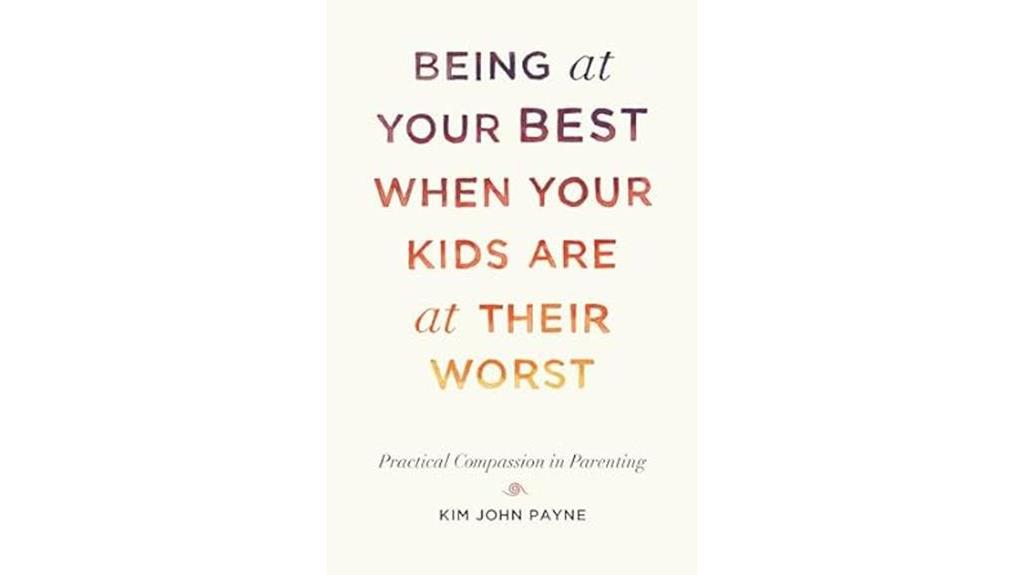
For parents seeking practical guidance on maintaining composure and showing compassion during challenging parenting moments, 'Being at Your Best When Your Kids Are at Their Worst: Practical Compassion in Parenting' stands out as a valuable resource. This book has garnered positive reviews and recommendations for its practical advice and approachable writing style. Readers appreciate the concise and helpful nature of the content, along with the author's use of personal experiences in education.
Despite these strengths, some concerns have been raised regarding the book's applicability to children with attachment issues like Reactive Attachment Disorder. Additionally, a few readers feel that the parenting approaches presented may oversimplify complex behavioral challenges.
However, the book's focus on compassion and empowering parenting techniques remains a highlight, with many sharing how it has helped improve their relationships with their children and reduce conflicts within the family.
Best For: Parents looking for practical and compassionate parenting guidance during challenging moments with their children.
Pros:
- Practical advice and approachable writing style.
- Concise and helpful content with practical tools for parenting.
- Focus on compassion and empowering parenting techniques.
Cons:
- Lack of accommodation for children with attachment issues like Reactive Attachment Disorder.
- Oversimplification of parenting approaches may not suit children with deep behavioral challenges.
- Heavy use of metaphors and catchphrases in the book.
Parenting at Your Best: Powerful Reflections and Straightforward Tips for Becoming a Mindful Parent
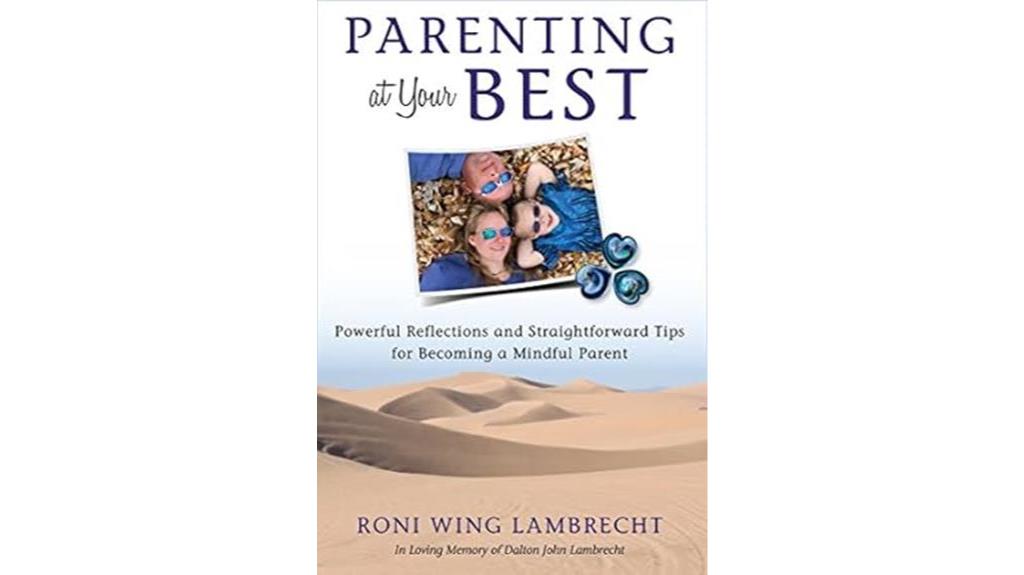
This book, Parenting at Your Best, is a valuable resource for new and soon-to-be parents as well as those who've experienced loss, offering powerful reflections and practical tips for mindful parenting.
Written by Roni Wing Lambrecht, the book draws from the author's personal journey through grief after losing her teenage son, Dalton. It emphasizes the importance of intentional parenting and treasuring moments with our children.
The book focuses on making each parenting moment meaningful, highlighting the significance of respect in parent-child relationships. It provides straightforward and down-to-earth advice, promoting inclusivity and open communication within families.
Readers have found the book to evoke a range of emotions, from smiles to tears, while offering practical and heartfelt guidance for reflecting on parenting approaches.
Overall, Parenting at Your Best is praised for its sincerity, practicality, and ability to resonate with parents looking to enhance their parenting skills.
Best For: Parents looking to enhance their parenting skills and embrace mindful parenting practices.
Pros:
- Offers powerful reflections and practical tips for mindful parenting.
- Written by an author who shares personal experiences and wisdom.
- Emphasizes the value of respect in parent-child relationships.
Cons:
- May evoke strong emotional responses in readers, including tears.
- Focuses on grief and loss, which may be challenging for some readers.
- Some readers may find the approach too sentimental or emotional.
The Mindful Parent
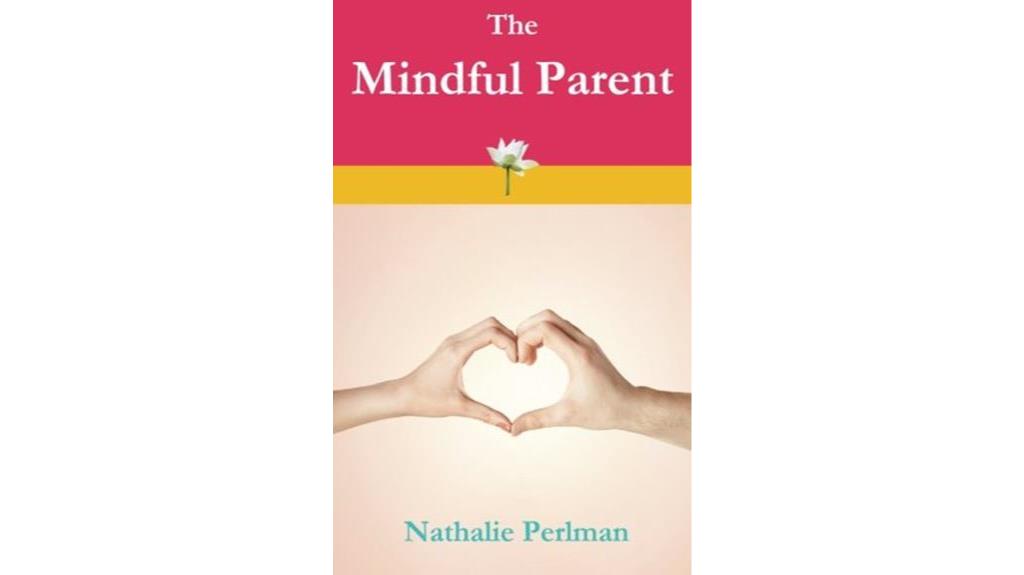
Exploring 'The Mindful Parent' offers valuable insights and practical strategies for parents seeking to cultivate stronger parent-child relationships through mindfulness. This book emphasizes the importance of shifting one's mindset to enhance the dynamics with their children.
It provides actionable tips on incorporating mindfulness into parenting practices to foster better connections and personal development. Despite a few typographical errors, readers have generally appreciated the informative and concise nature of the book.
Readers commend it as essential reading for all parents, praising its ability to offer guidance and help them embrace their parental responsibilities. While some readers have noted the need for better editing and felt the book leaned too heavily on promoting mindful parenting, overall, it's recommended for those looking to enrich their parenting journey with mindfulness principles.
Best For: Parents looking to deepen their bond with their children through mindful practices.
Pros:
- Offers practical tips for applying mindfulness to parenting.
- Emphasizes the importance of changing one's mindset for better parent-child relationships.
- Provides insightful information for personal growth and enhancing parenting skills.
Cons:
- Contains typographical errors that may be distracting.
- Some readers feel it focuses too much on selling the concept of mindful parenting.
- Implementation tips could be more extensive for practical application.
Factors to Consider When Choosing Mindful Parenting Books

When selecting mindful parenting books, it's crucial to take into account key selection criteria such as the author's expertise and the book's reputation.
Assessing the content, reader engagement levels, and practical application tips within the book can help ascertain its usefulness for your parenting journey.
Search for impactful parenting techniques that align with your values and parenting style to make the most of your reading experience.
Key Selection Criteria
Taking into account the author's background and expertise in parenting, mindfulness, or child psychology is vital when selecting mindful parenting books. Authors with experience in these areas are more likely to provide valuable insights and practical advice that can resonate with your parenting journey.
It's essential to look for books that offer practical tips, techniques, and strategies for mindful parenting, as these can be directly applied to your daily interactions with your children. Checking for recommendations or reviews from other parents, educators, or professionals in the field can also give you a better understanding of the book's effectiveness and relevance.
Consider the specific focus of the book, such as ADHD parenting, emotional intelligence, or mindfulness practices, to make sure it aligns with your current needs and challenges. Evaluating the readability and engaging nature of the book is important to make sure that it complements your parenting style and preferences, making the learning process more enjoyable and effective.
Book Content Evaluation
Considering the practicality and relevance of the content is essential when selecting mindful parenting books. It's important to evaluate the depth of insights and wisdom shared by the authors, as well as the presence of personal experiences and relatable anecdotes within the book.
Additionally, looking at how the content aligns with your specific parenting needs and challenges is crucial. Examining the author's background and expertise can provide insight into the basis of their advice, helping you determine the credibility of the information presented.
When evaluating book content, focus on practical tips and strategies offered for implementing mindful parenting, seeking a balance between theory and actionable guidelines. Consider whether the information provided aligns with your parenting goals and values, and if the book addresses common parenting challenges relevant to your family dynamics.
Checking reader feedback can also offer valuable insights into how the book's content has helped others improve their parenting skills and relationships with their children.
Reader Engagement Levels
To choose mindful parenting books effectively, it's important to assess the levels of reader engagement, which play a significant role in the book's impact on implementing mindfulness techniques in parenting.
Engaging content is crucial as it keeps readers interested and motivated to apply the teachings within the book. Interactive elements such as exercises, worksheets, and reflection prompts can enhance engagement by encouraging active participation. Additionally, personal anecdotes and relatable stories can resonate with readers, making the content more relatable and engaging.
Books that offer practical, actionable advice tend to engage readers more effectively in applying mindfulness techniques in parenting situations. Reader engagement levels can be gauged by the emotional responses evoked, such as tears, inspiration, and reflection. Positive feedback from readers praising the book's impact and practical advice is a strong indicator of high engagement levels.
Furthermore, personal experiences shared by readers and recommendations based on practicality and value demonstrate a deep connection and high level of engagement with the book's content.
Practical Application Tips
Practical application tips found in mindful parenting books serve as invaluable resources for parents seeking to implement mindfulness techniques in their day-to-day interactions with their children. These tips offer step-by-step guidance on applying mindfulness practices in various parenting challenges. They provide concrete strategies for enhancing self-awareness, managing emotions, and fostering positive communication with kids. Often, these tips include exercises, reflection prompts, and real-life examples to illustrate effective mindful parenting.
Impactful Parenting Techniques
When choosing mindful parenting books, it's essential to ponder the specific impactful parenting techniques they offer to enhance your relationship with your child.
Effective parenting techniques focus on building strong parent-child relationships and fostering emotional intelligence. Mindful parenting involves practicing self-awareness, empathy, and compassion towards oneself and children.
Techniques such as active listening, setting boundaries with empathy, and modeling positive behaviors are key in mindful parenting. Mindfulness practices like deep breathing, meditation, and self-reflection help parents respond calmly to challenging situations.
These techniques promote emotional regulation, communication skills, and positive behavior modeling for children.
Building strong parent-child relationships based on respect, open communication, and emotional connection is vital.
Being present in the moment, actively listening to your children, setting boundaries with love and consistency, and encouraging self-awareness and emotional regulation are fundamental in mindful parenting.
Positive discipline strategies that prioritize teaching and guiding children are also emphasized.
Frequently Asked Questions
How Can Mindful Parenting Help With Managing ADHD in Children?
Mindful parenting can benefit children with ADHD by fostering increased self-awareness and emotional regulation. By practicing mindfulness techniques, parents can help children manage impulsivity and improve attention span.
Mindful parenting also promotes open communication, patience, and empathy, which are essential in supporting children with ADHD. Setting clear boundaries and consistent routines in a mindful manner can create a stable environment that aids in managing ADHD symptoms effectively.
What Are the Key Differences Between Mindful Discipline and Traditional Discipline?
Mindful discipline emphasizes understanding a child's emotions and encourages positive behavior through communication. Traditional discipline often focuses on punishment and obedience.
By fostering empathy and connection, mindful discipline builds a child's self-regulation skills and strengthens the parent-child bond. In contrast, traditional discipline may lead to power struggles and resentment.
Incorporating mindfulness techniques, such as deep breathing and active listening, can enhance the effectiveness of discipline strategies and promote a harmonious parent-child relationship.
How Can Mindfulness Practices Benefit Parents During Childbirth and Beyond?
Mindfulness practices offer parents invaluable tools during childbirth and beyond. By cultivating present moment awareness and non-judgmental acceptance, parents can navigate the challenges of labor with greater calm and focus.
Post-birth, mindfulness aids in managing stress, enhancing bonding with the newborn, and fostering emotional resilience. This practice enables parents to respond to their child's needs mindfully, promoting healthy relationships and effective communication.
Ultimately, mindfulness supports parental well-being and nurtures a harmonious family dynamic.
Are There Specific Mindfulness Techniques Tailored for Raising Emotionally Intelligent Children?
Mindfulness techniques can be adapted to nurture emotionally intelligent children. Practices like active listening, empathy modeling, and teaching emotional regulation skills are key.
Mindful breathing exercises can help kids manage big emotions. Setting a calm environment and encouraging open communication foster emotional intelligence.
How Do Mindful Parenting Books Contribute to Self-Understanding and Improved Parent-Child Relationships?
Mindful parenting books serve as guiding lights, illuminating the path to self-discovery and deeper parent-child connections. By delving into these insightful texts, one can uncover hidden aspects of themselves and understand how their actions influence relationships.
These resources offer practical tools and perspectives that foster empathy, communication, and mutual respect within families. Through self-reflection and newfound knowledge, parents can cultivate stronger bonds with their children, nurturing understanding and harmony in their interactions.
Are the Books in the Mindful Parenting List Still Relevant and Worth Reading in 2024?
Looking for the best parenting books in 2024? The books in the Mindful Parenting list are still relevant and worth reading. With timeless advice on raising children in the digital age, fostering empathy, and maintaining a balanced family life, these books remain essential for parents navigating the challenges of modern parenting.
Conclusion
As parents, we're like gardeners nurturing our children, planting seeds of mindfulness and compassion. By reading the best mindful parenting books, we equip ourselves with the tools to cultivate a peaceful and harmonious environment for our families to thrive.
Just as a well-tended garden flourishes with care and attention, so too can our children bloom into resilient and compassionate individuals with the guidance provided by these insightful books.
Vetted
14 Best French Parenting Books Every Parent Should Read for Better Parenting
Wondering how French parenting can transform your approach? Explore these 14 essential books for invaluable insights and elevate your parenting game!

Here’s a stack of well-known French parenting books that can step up your parent game. **Bringing Up Bébé** and **French Kids Eat Everything** offer secrets on setting rules, encouraging independence, and getting kids to eat healthily. Books such as **French Parents Don’t Give In** and **French Twist** provide fantastic tips for raising kids. These books guide you in teaching patience, resilience, and good behavior. They highlight a balanced parenting style inspired by French insights. Curious to see how these books can transform your parenting journey? Jump in and find out!
Key Takeaways
- Explore French parenting methods for setting boundaries and fostering independence.
- Discover practical tips for discipline, routines, and child-rearing philosophies.
- Compare French techniques with American parenting styles for diverse insights.
- Implement actionable advice on manners, healthy habits, and sibling conflicts.
- Enhance parenting skills with strategies for instilling responsibility and self-control.
Bringing Up Bébé: One American Mother Discovers the Wisdom of French Parenting
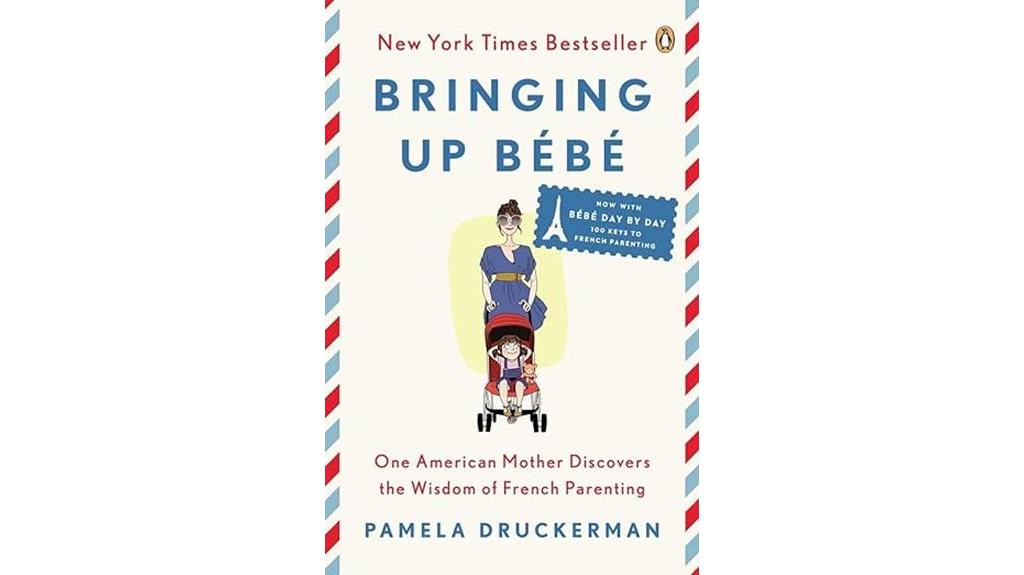
For those seeking a fresh perspective on parenting methods, 'Bringing Up Bébé' offers valuable insights into the wisdom of French parenting practices. This book, written by Pamela Druckerman, explores the contrast between French and American parenting approaches, highlighting the benefits of the former in fostering well-behaved children and confident mothers.
French parenting focuses on setting boundaries, promoting independence in children, and instilling patience and resilience from a young age. The emphasis on adult time in the evenings and teaching children to self-soothe for better sleep are practices that stand out.
Additionally, the French approach to food education, manners, and making mealtime enjoyable is enlightening. 'Bringing Up Bébé' provides practical strategies that can be applied in daily parenting routines, making it a valuable read for those interested in exploring different cultural parenting perspectives.
Best For: Parents looking to explore alternative parenting methods and gain insights into fostering well-behaved children and building confidence in themselves.
Pros:
- Offers a fresh perspective on parenting by contrasting French and American approaches.
- Provides practical strategies that can be applied in daily parenting routines.
- Emphasizes setting boundaries, promoting independence, and instilling patience and resilience in children.
Cons:
- May generalize parenting methods, leading to criticism from those with diverse parenting styles.
- Sparks debate and differing opinions among readers due to the comparison between French and American parenting styles.
- Some may find the emphasis on discipline and routine in French parenting methods too rigid for their liking.
French Kids Eat Everything: Raising Happy, Healthy Eaters
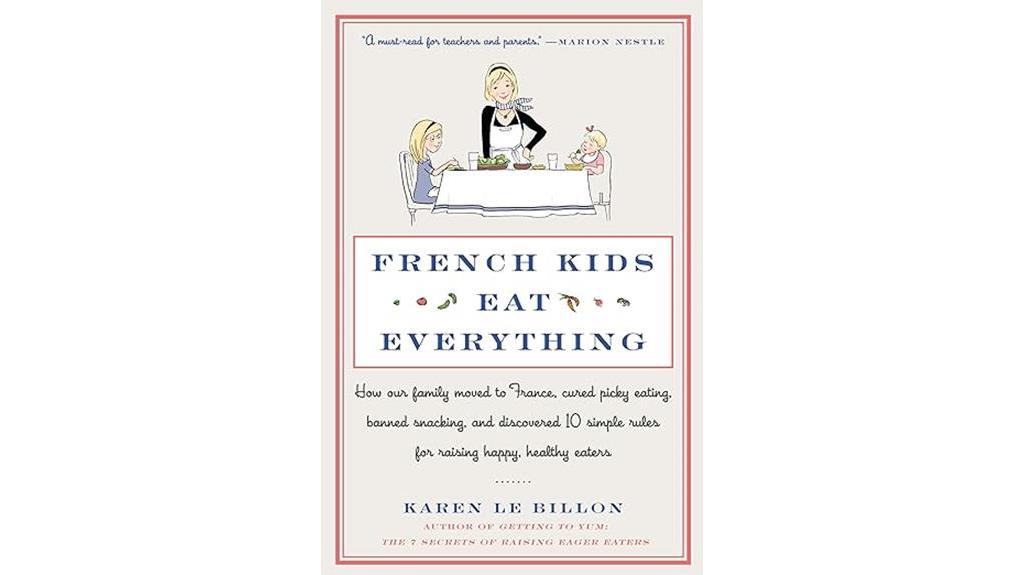
The 'French Kids Eat Everything' book offers practical strategies for fostering healthy eating habits in children and transforming family mealtimes into enjoyable experiences. Implementing the French eating habits outlined in the book has had a significant impact on my family's lifestyle.
By incorporating the concept of a four-course meal and encouraging my children to try new foods, I've witnessed positive changes in their eating behaviors. They now prefer healthier options and have learned to eat until satisfied, not overly full.
Embracing these principles hasn't only improved our food choices but also promoted better health and nutrition. Long-term effects include weight management, enhanced eating habits, and a positive shift in my child's food preferences.
I recommend exploring the French eating approach for a healthier, happier family life.
Best For: Families looking to improve their children's eating habits and transform mealtime experiences into enjoyable and healthier ones.
Pros:
- Practical strategies for fostering healthy eating habits in children.
- Positive impact on children's food preferences and eating behaviors.
- Promotes better health and nutrition through gradual changes in food choices.
Cons:
- Requires consistent effort and commitment to implement the French eating habits.
- Some children may initially resist trying new foods or adapting to the four-course meal concept.
- May be challenging to maintain the principles in busy or hectic family schedules.
French Parents Don't Give In: 100 Parenting Tips From Paris
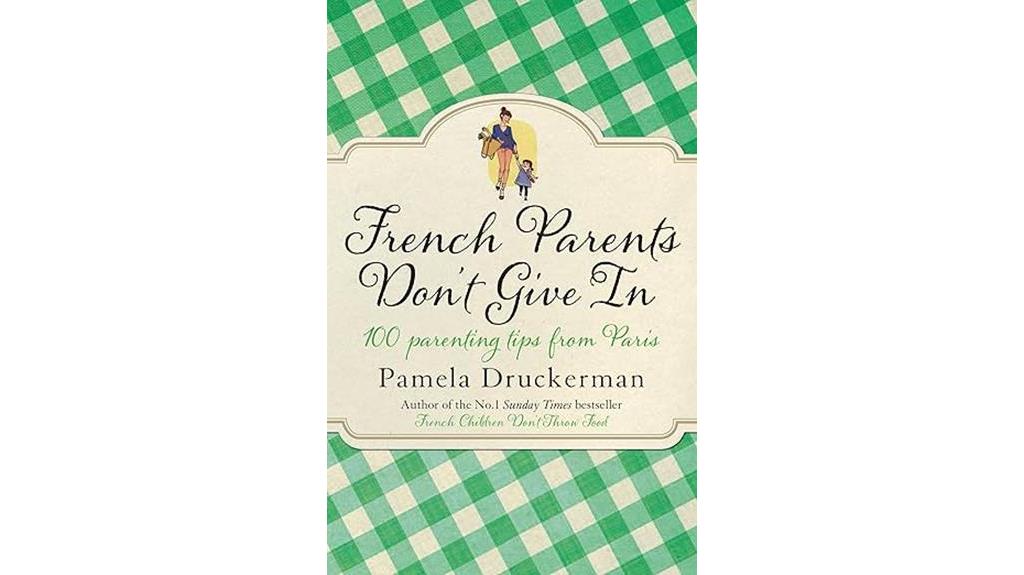
'French Parents Don't Give In: 100 Parenting Tips From Paris' offers practical advice and cultural insights that resonate with parents seeking a balanced and respectful approach to raising children. The book emphasizes the importance of consistency, respect, personal space, sociability, and encouragement in parenting. It acknowledges that children aren't always perfect but advocates for showing love and communicating this to them.
The book is praised for its entertaining and enlightening content, with tips presented in easily digestible paragraphs. It's particularly recommended for busy parents, as it allows for quick reading sessions. Readers appreciate the opportunity to compare parenting styles and customize the tips to suit their own households.
Overall, 'French Parents Don't Give In' provides a sensible and educational approach to child-rearing, offering valuable insights into French culture.
Best For: Parents seeking a practical and respectful approach to raising children with cultural insights.
Pros:
- Entertaining and enlightening content.
- Easily digestible tips in summary paragraphs.
- Valuable insights into French culture.
Cons:
- Higher price for Kindle edition.
- Limited recipes included.
- May not offer radically new parenting strategies.
French Twist: An American Moms Experiment in Parisian Parenting
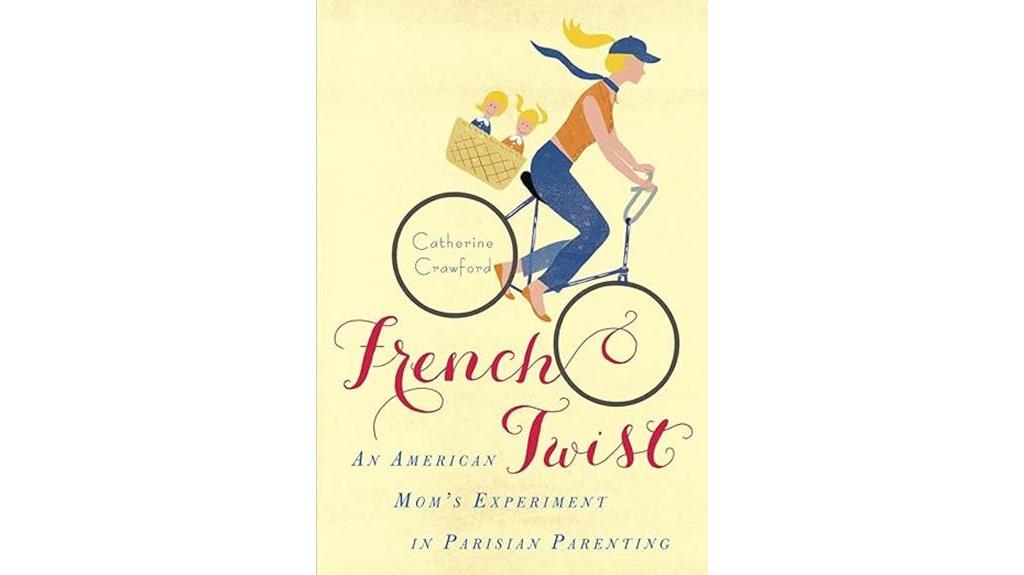
Ideal for parents seeking a balanced approach, 'French Twist: An American Moms Experiment in Parisian Parenting' offers practical insights into blending French and American parenting styles. The book has garnered positive reviews for its practical tips and lessons based on the author's experiences.
It stands out for addressing the 'HOW' element often missing in other parenting books, providing valuable guidance for parents looking to incorporate French techniques into their American parenting style. By contrasting French emphasis on respect, good manners, and discipline with American tendencies towards overindulgence and lack of boundaries, the book prompts readers to ponder the benefits of integrating French methods.
From instilling values like appreciation for good food and manners to dealing with societal expectations and setting boundaries, 'French Twist' equips parents with tools for maneuvering the challenges of raising well-rounded children.
Best For: Parents looking to incorporate French parenting techniques into their American parenting style for a more disciplined and respectful approach.
Pros:
- Practical insights and tips based on the author's experiences.
- Contrasts between French and American parenting styles for a well-rounded perspective.
- Emphasis on instilling values like appreciation for good food and manners.
Cons:
- May not fully address the individuality of each child's needs.
- Some readers may find the comparison of French and American parenting styles too generalized.
- Implementing strict boundaries and discipline may be challenging for parents used to a more lenient approach.
FRENCH CHILDREN DON'T THROW (B)
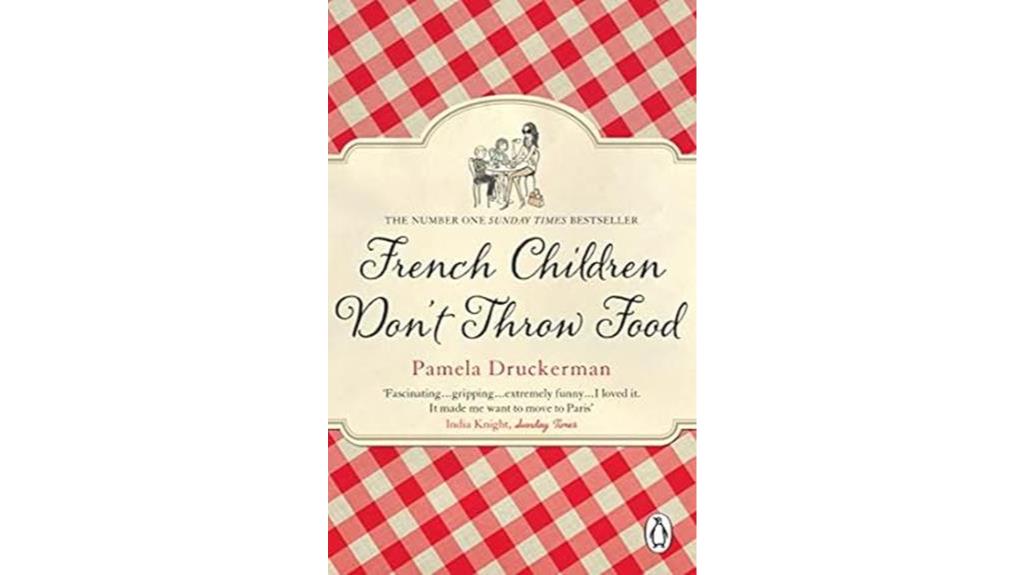
For parents seeking a fresh perspective on raising children, 'French Parenting Books' offers valuable insights into effective parenting techniques and cultural comparisons.
One notable aspect discussed in the book is the idea that French children don't throw tantrums. This concept highlights the emphasis on teaching children self-control and emotional regulation from a young age.
By setting clear boundaries and expectations while also allowing children the space to express themselves, French parenting aims to foster independence and respect.
The book provides practical tips on how parents can implement these strategies in their own parenting style, emphasizing the importance of consistency and patience.
Through personal anecdotes and research-based evidence, readers can gain a better understanding of how this approach can lead to more harmonious family dynamics.
Best For: Parents looking to explore a new parenting philosophy that emphasizes self-control and emotional regulation from a young age.
Pros:
- Offers valuable insights into effective parenting techniques and cultural comparisons.
- Provides practical tips on implementing French parenting strategies.
- Emphasizes fostering independence and respect in children.
Cons:
- May not align with all parenting styles or cultural beliefs.
- Requires consistency and patience to see desired results.
- Some parents may find it challenging to transition to a different parenting approach.
Baby Day by Day: 100 Keys to French Parenting
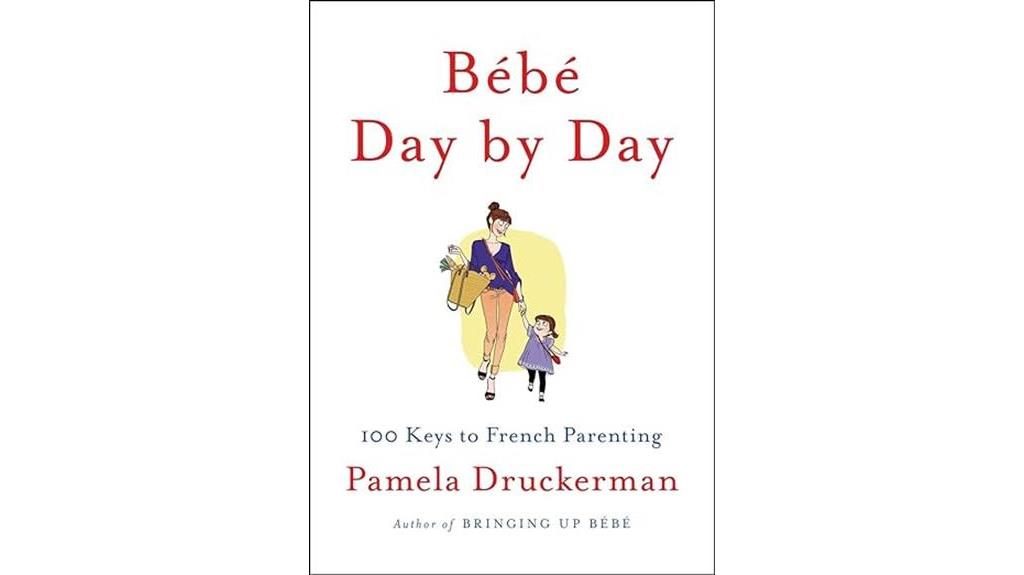
When seeking a practical and concise guide to French parenting principles, 'Baby Day by Day: 100 Keys to French Parenting' stands out as a valuable resource for new parents or those interested in a laid-back approach. This book offers an appealing and easy-to-read format, condensing essential French parenting concepts into short, shareable tidbits.
It serves as a refresher on the principles outlined in 'Bringing Up Bebe,' making it ideal for parents looking to deepen their understanding of French parenting techniques. 'Baby Day by Day' is often compared to its predecessor, being seen as a more condensed version that provides a quick read and serves as a convenient reference guide.
Readers have reported that this book influences their parenting views, providing confidence, insights, and a fun, informative perspective on applying French parenting principles in real-life situations.
Best For: New parents or individuals interested in a laid-back parenting approach.
Pros:
- Appeals to those seeking a practical and concise guide to French parenting.
- Condenses essential French parenting concepts into easily digestible tidbits.
- Provides insights and confidence for future parenting endeavors.
Cons:
- May be seen as a condensed version of 'Bringing Up Bebe' for readers seeking more in-depth content.
- Some readers may prefer a more detailed exploration of French parenting techniques.
- Limited availability in languages other than English may hinder accessibility for non-English speakers.
Bébé Gourmet: 100 French-Inspired Baby Food Recipes

One standout feature of 'Bébé Gourmet: 100 French-Inspired Baby Food Recipes' is its wide range of nutritious and delicious meal options suitable for parents seeking to raise adventurous eaters. The book offers an extensive selection of recipes ranging from first foods to meals for older eaters, including adults.
With insights from pediatric nutritionist and endocrinologist Dr. Jean Lalau Keraly, the recipes cater to different age milestones, encouraging the introduction of exciting flavors and textures to children. From easy puréed single-fruit meals to more complex combinations, 'Bébé Gourmet' guides parents on how to adapt recipes for older eaters, providing clear instructions and pictures for reference.
This book not only helps in expanding cooking skills but also boosts confidence in feeding children a diverse range of foods, making it a valuable resource for parents looking to introduce their babies to a variety of flavors.
Best For: Parents looking to introduce their babies to a diverse range of nutritious and delicious French-inspired baby food recipes.
Pros:
- Offers a wide range of recipes suitable for different age milestones.
- Provides clear instructions and pictures for easy adaptation and reference.
- Encourages adventurous eating habits in children through exciting flavors and textures.
Cons:
- May require some additional ingredients not commonly found in all households.
- Recipes might be time-consuming for parents with busy schedules.
- Not all children may enjoy the French-inspired flavors and textures.
More than Happy: The Wisdom of Amish Parenting
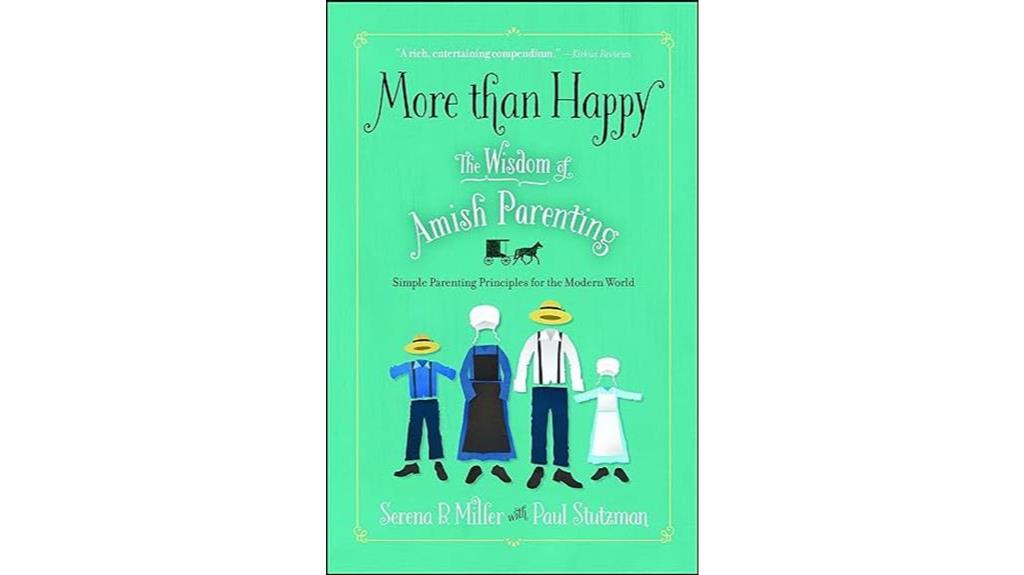
The insights from 'More than Happy: The Wisdom of Amish Parenting' offer a unique perspective on raising children that resonates with those seeking a simpler and values-driven approach in parenting. This book has gained praise for its practical advice and comparisons between Amish and modern parenting styles, emphasizing the importance of instilling values in children.
Readers find the emphasis on faith, family, and generosity as essential elements in child-rearing to be enlightening and invigorating. By delving into the Amish culture and values, the book provides a wealth of information on how traditional practices can be applied to modern family life.
Despite some criticisms regarding occasional repetitions or an excessive focus on personal opinions, 'More than Happy' is widely recommended for its thought-provoking content and valuable insights into raising well-adjusted children.
Best For: Parents looking for a values-driven and insightful approach to raising children that emphasizes faith, family, and generosity.
Pros:
- Practical advice on parenting with valuable insights into Amish culture and values.
- Thought-provoking content that encourages reflection and new ideas in child-rearing.
- Emphasis on instilling character and values in children for a meaningful and fulfilling upbringing.
Cons:
- Occasional repetitions in the content.
- Excessive focus on the authors' personal opinions may overshadow general advice.
- Some readers may find the comparisons between Amish and modern parenting styles limiting or not applicable to their own situations.
How Not to Calm a Child on a Plane: And Other Lessons in Parenting
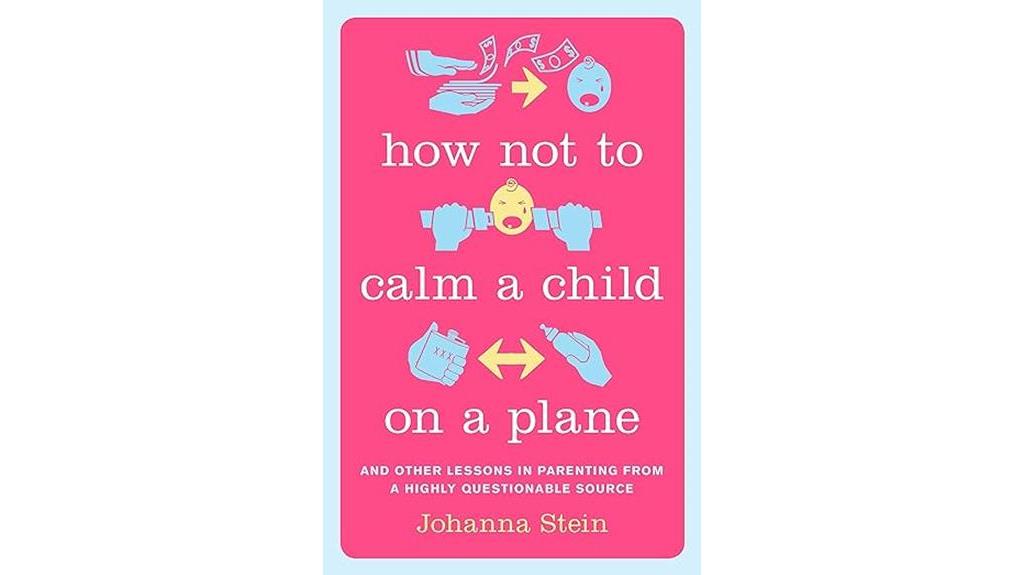
For those seeking a humorous and relatable take on the challenges of parenting, 'How Not to Calm a Child on a Plane: And Other Lessons in Parenting' by Johanna Stein is the perfect choice. Readers have praised Stein's book for its engaging storytelling, humor, and ability to capture the essence of motherhood and parenthood.
The book is described as hilarious, relatable, and a great gift for mothers. Stein's writing style, known for its funny and exaggerated descriptions, has resonated with many, although some find it crass but enjoyable.
Readers appreciate the honesty and humor in Stein's storytelling, feeling connected and not alone in the journey of parenting. Whether you're a parent or not, this book is recommended for its wit, humor, and true-to-life perspectives on the rollercoaster ride of parenthood.
Best For: Parents and non-parents looking for a hilarious and relatable take on the ups and downs of parenthood.
Pros:
- Engaging storytelling filled with humor and wit.
- Captures the essence of motherhood and parenting in a relatable way.
- Offers a perfect gift option for mothers or new parents.
Cons:
- Some readers may find the humor a bit crass.
- The exaggerated descriptions may not appeal to all readers.
- Not suitable for those looking for a serious or instructional parenting book.
French Braid: A novel

When considering French Parenting Books, 'French Braid: A novel' by Anne Tyler offers an engaging exploration of family dynamics and relationships over 60 years. This novel, split into 8 chapters with a large font, spans 342 pages and was first published in 2022, starting in 2010.
Anne Tyler's writing style authentically portrays real-life situations with a focus on families and relationships seen through the characters in the story. Themes of forgiveness, judgment, and the limits of tolerance are woven into the narrative, with characters like Serena, James, Mercy, and Robin showcasing the intricacies of family interactions. The use of the French braid metaphor symbolizes the interconnectedness and nuances of family relationships in Tyler's storytelling.
Readers appreciate the relatable nature and character depth within the novel, praising Tyler's skill in crafting narratives that explore family dynamics and individual growth over time.
Best For: Readers who enjoy character-driven narratives exploring family dynamics and relationships with a focus on subtle storytelling.
Pros:
- Authentic portrayal of real-life situations and family interactions.
- Engaging exploration of themes like forgiveness, judgment, and tolerance.
- Skillful character development and relatable storytelling techniques.
Cons:
- Some concerns about similarities to the author's previous works.
- May not appeal to readers seeking fast-paced plots.
- Limited action scenes or high-drama moments.
Loving the Little Years: Motherhood in the Trenches
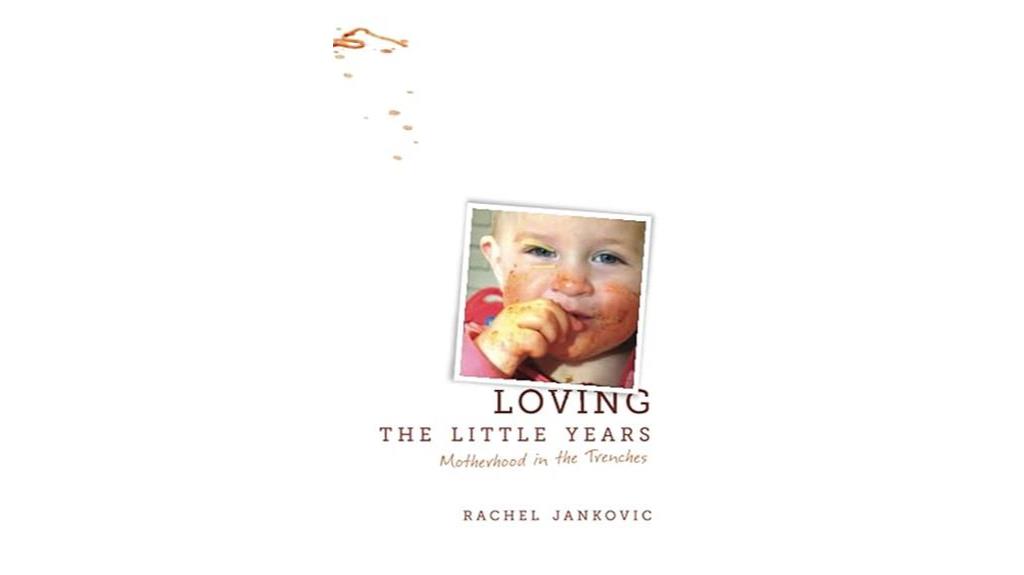
Optimizing my parenting approach with practical and grace-based advice, 'Loving the Little Years: Motherhood in the Trenches' resonates deeply with the challenges and joys of raising young children. Authored by Rachel Jankovic, this book offers a collection of short vignettes that provide counsel and encouragement to Christian parents, especially mothers, journeying through the process of raising children.
Readers, including husbands, fathers, and first-time moms, have praised the book for its practical insights and wisdom tailored for parents of small children. With a focus on grace-based parenting and addressing heart issues rather than mere behavior management, 'Loving the Little Years' encourages parents to embrace motherhood as a high calling.
Through storytelling and practical scenarios, the book equips parents with strategies to manage sibling conflicts, prioritize relationships over possessions, and nurture their children's spiritual growth.
Best For: Parents seeking practical and grace-based advice for navigating the challenges and joys of raising young children.
Pros:
- Offers practical insights and wisdom tailored for parents of small children.
- Emphasizes grace-based parenting and addressing heart issues over behavior management.
- Equips parents with strategies for managing sibling conflicts, prioritizing relationships, and nurturing children's spiritual growth.
Cons:
- May not provide detailed solutions for specific parenting challenges.
- Focus on Christian parenting may not resonate with all readers.
- Short vignettes format may not appeal to those looking for in-depth analysis on parenting topics.
Five French Hens: A warm and uplifting feel-good novel from USA Today Bestseller Judy Leigh

The novel 'Five French Hens' by Judy Leigh offers a heartwarming exploration of life, love, and friendship for readers seeking an uplifting and relatable story. In this feel-good novel, five women in their 70s navigate challenges and discover what truly matters in life.
The characters, including Jen, Tess, Rose, Della, and Pam, come together over aqua fit classes and set out on a journey of self-discovery in Paris. Judy Leigh, a USA Today Bestselling author, skillfully weaves themes of love, friendship, and personal growth into the narrative, creating a compelling and engaging read.
Readers praise the book for its well-developed characters, humor, and poignant life lessons that resonate with women of all ages. 'Five French Hens' is recommended as an entertaining and heartwarming novel that celebrates the joys of friendship and embracing life's adventures.
Best For: Readers looking for a heartwarming and uplifting novel centered around themes of friendship, love, and rediscovery with relatable older protagonists.
Pros:
- Engaging storytelling that resonates with women of all ages.
- Well-developed characters and humor that adds depth to the narrative.
- Poignant life lessons and positive messages about embracing life's adventures.
Cons:
- Some readers may find the storyline predictable.
- Limited focus on certain character backgrounds and experiences.
- The fortune teller element may feel cliché to some readers.
When in French: Love in a Second Language

For those seeking a blend of personal narrative and linguistic insights in exploring cross-cultural relationships, 'When In French' by Lauren Collins offers an engaging and informative read. The book explores the author's experiences with her French husband, Olivier, unraveling the complexities and delights of managing a relationship in a second language.
Through seven essays, Collins delves into the challenges and rewards of immersing oneself in a divergent cultural experience. Beyond just language, the book touches on history, linguistics, and the Academie Francais, providing readers with an enchanting journey through the nuances of cross-cultural love.
While some readers praise the charm and wit of the book, others critique its verbosity and academic tone. Overall, 'When In French' remains a unique and thought-provoking exploration of love in a second language.
Best For: Readers interested in exploring cross-cultural relationships through a blend of personal narrative and linguistic insights.
Pros:
- Offers a unique perspective on managing relationships in a second language.
- Provides engaging insights into history, linguistics, and cultural immersion.
- The mix of personal storytelling and academic exploration makes for a thought-provoking read.
Cons:
- Some readers may find the focus overly academic and verbose.
- Criticisms include a lack of focus on the love story aspect and negative portrayals of certain elements.
- Suggestions for improvement include trimming down content and providing citations for presented facts.
I Spy a Great Reader: Unlock the Literary Secret for Your Child
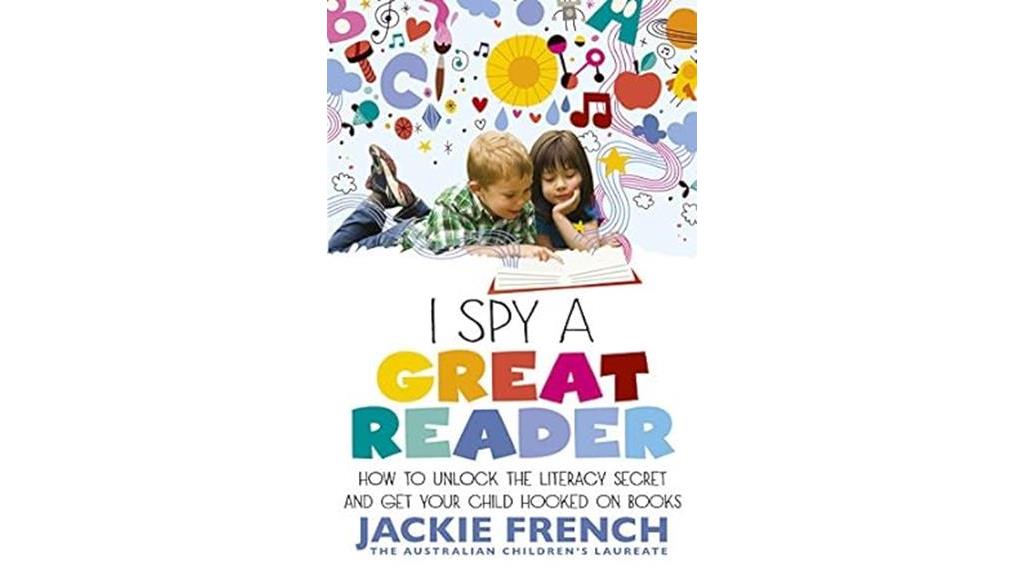
When seeking to reveal the literary secret for your child, 'I Spy a Great Reader: How to Reveal the Literary Secret and Get Your Child Hooked on Books' from the French Parenting Books collection proves to be a valuable resource.
This book offers practical insights for parents and educators on fostering a love for reading in children. While it introduces the concept of 'learning styles,' which may not be universally accepted, the emphasis on adapting information delivery methods to suit different learners is commendable.
Despite some critiques regarding the accuracy of the discussion on learning styles, the overall message of promoting diverse learning approaches is essential for effective education.
Parents and educators can benefit from the book's ideas to support children in cultivating a passion for reading and literacy.
Best For: Parents and educators seeking practical insights on fostering a love for reading in children.
Pros:
- Offers practical insights for promoting reading habits among children.
- Emphasizes the importance of adapting information delivery methods to cater to different learners' needs.
- Provides valuable ideas that can be implemented in practice.
Cons:
- Discusses the concept of 'learning styles' which may not align with traditional teaching methods.
- Some critiques regarding the accuracy of the discussion on learning styles.
- Could benefit from further exploration of evidence-based educational practices.
Factors to Consider When Choosing French Parenting Books

When selecting French parenting books, it's crucial to take into account key selection criteria, examine the content of the book, and take into consideration reader engagement.
These elements can offer valuable insights into the practical applications of the book and its potential impact on your parenting approach.
Key Selection Criteria
Taking into account the author's expertise in parenting or child development is crucial when selecting French parenting books. It guarantees that the information provided is credible and based on sound principles.
Another key criterion to take into consideration is finding books that align with your parenting style and values. This helps in implementing the strategies and tips effectively in your everyday parenting journey.
Checking reviews and ratings from trusted sources or fellow parents can also guide you in choosing the right book. Look for practical tips and strategies that are easy to incorporate into your routine.
Additionally, consider the author's background and expertise in child development and education to ensure reliable information. It's beneficial to select books that resonate with your personal parenting philosophy and values, ensuring they complement your approach.
Moreover, seeking out French parenting books that cover various topics like early childhood development, discipline, and communication strategies can provide a well-rounded perspective on parenting.
Book Content Analysis
In exploring French parenting books, one should focus on the book's exploration of French parenting methods, practical advice for daily implementation, and cultural insights.
When selecting a book, consider how it explores French parenting techniques like discipline, routines, and child-rearing philosophies. Look for practical tips that can be easily applied in your daily life to incorporate these methods into your own parenting style.
Additionally, seek out books that provide cultural insights and comparisons between French and American parenting styles, offering a deeper understanding of different approaches. Consider recommendations and personal experiences shared by the author or other parents who've put the book's principles into practice.
Evaluate how the book impacts parenting strategies, child behavior, and overall family dynamics based on reader reviews and feedback. By analyzing these factors, you can choose a French parenting book that best aligns with your goals and parenting philosophy.
Reader Engagement Factors
Exploring French parenting books involves considering various reader engagement factors that can influence one's choice when selecting a book. Factors such as relatable anecdotes, practical tips, and humor play a significant role in keeping readers interested and invested in the content.
The use of storytelling, personal experiences, and real-life examples can enhance reader engagement by making the information more relatable and engaging. Additionally, providing actionable advice, clear explanations, and relevant information increases reader engagement and retention.
Interactive elements like reflective questions and prompts for self-assessment can also make parenting books more engaging. The writing style, tone, structure of the content, and relevance of the information to the reader's experiences are essential aspects that impact reader engagement.
Compelling storytelling, relatable characters, interactive elements, and engaging design elements like illustrations and layouts can further enhance reader engagement in French parenting books. Incorporating activities, questions, and prompts for reflection keeps readers actively involved and interested in the content.
Practical Application Insights
When considering French parenting books, it's essential to prioritize practical application insights that focus on setting boundaries and promoting independence in children. French parenting emphasizes consistency, respect, and encouragement as fundamental elements for successful parenting.
These books offer strategies for instilling patience, teaching manners, and promoting healthy eating habits. Additionally, tips for managing sibling conflicts, fostering sociability, and promoting self-control are commonly found in French parenting literature.
Practical application insights in French parenting books provide guidance for parents on creating a structured, loving, and respectful environment for children. They often include tips on implementing parenting techniques, fostering independence, and promoting healthy habits.
These insights are based on research, cultural practices, and expert advice, offering actionable advice and hands-on activities to help apply the principles of French parenting in real-life scenarios. Overall, French parenting books equip parents with practical solutions for common parenting challenges, emphasizing the importance of boundaries, open communication, and a strong parent-child relationship.
Impact on Parenting
Considering the impact of French parenting books on my approach, I prioritize selecting literature that aligns with my parenting values and goals.
French parenting books can offer valuable insights into strategies that promote patience, setting boundaries, and fostering independence in children. They emphasize creating a nurturing environment based on respect, discipline, and healthy habits, such as family mealtime and diverse food exposure.
By adopting a structured and authoritative parenting style inspired by French techniques, parents may witness improvements in behavior and relationships with their children. These books also stress the importance of instilling responsibility and self-control in children from a young age through clear boundaries and expectations.
Additionally, French parenting literature encourages promoting self-reliance and adaptability in children to navigate various social situations. Exploring alternative child-rearing practices from French parenting books can help parents enhance their children's emotional intelligence, cognitive development, and overall well-being.
Cultural Relevance
Understanding the cultural relevance of French parenting books is vital when selecting literature to align with your parenting values and goals. French parenting books often emphasize cultural aspects like respect, discipline, and family dynamics unique to French culture. By delving into these books, readers can gain insights into traditional values, social norms, and parenting philosophies specific to France.
It's important to recognize that cultural nuances play a significant role in shaping parenting practices, and embracing these differences can enrich one's own parenting journey. French parenting books may contrast with American or other parenting styles, shedding light on the diverse approaches to child-rearing across different cultures. They highlight values such as independence, respect, and discipline, showcasing how these principles are integrated into parenting in France.
Frequently Asked Questions
Can French Parenting Techniques Be Applied to Children of All Ages?
French parenting techniques can be adapted for children of all ages. The principles of setting boundaries, fostering independence, and promoting respect are universal.
However, the application may vary based on the child's developmental stage. Younger children may require more hands-on guidance, while older children benefit from increased autonomy within structured limits.
Flexibility and personalized adjustments are key to successfully implementing French parenting methods across different age groups.
How Do French Parenting Books Address Discipline and Boundaries?
French parenting books address discipline and boundaries by emphasizing consistent communication, setting clear expectations, and implementing logical consequences.
They often highlight the importance of authoritative parenting, which balances warmth and structure.
These books provide practical strategies for handling challenging behaviors, promoting independence, and fostering respect between parents and children.
Are There Specific Tips for Introducing French Food to Picky Eaters?
When introducing French food to picky eaters, start with simple dishes like crepes or croissants to familiarize them with the flavors.
Gradually introduce more traditional French dishes like ratatouille or quiche, emphasizing the importance of trying new foods.
Get children involved in meal preparation to pique their interest and make them more willing to try different foods.
Encourage a positive attitude towards food exploration to help expand their palate over time.
Do These Books Discuss Cultural Differences in Parenting Approaches?
Yes, these books explore cultural differences in parenting approaches, offering valuable insights into how French parenting styles contrast with others.
They discuss topics like discipline, mealtime routines, and independence fostering.
By examining these cultural nuances, readers can gain a deeper understanding of the underlying principles that shape French parenting practices and how they may differ from their own cultural norms.
This comparative analysis can be enlightening and informative for parents seeking to broaden their parenting perspectives.
How Can Non-French-Speaking Parents Benefit From These Books?
As a non-French-speaking parent, I can benefit from these books by focusing on universal parenting principles rather than language barriers.
Think of these books as a roadmap, guiding us through the diverse terrain of parenting ideologies.
By extracting key concepts and adapting them to our cultural context, we can enrich our parenting toolkit.
Embracing the essence of French parenting, regardless of language fluency, allows us to cultivate a nurturing and supportive environment for our children.
Are French Parenting Books Also Helpful for Parenting Teenagers?
Looking for the best parenting books for teenagers? Many parents have found that French parenting books offer valuable insights and techniques that can be applied to parenting teenagers as well. While not specifically focused on teenage years, these books can provide helpful advice on raising children with respect and boundaries.
Conclusion
To sum up, it's worth noting that French parenting books offer valuable insights and strategies for raising well-rounded children.
One interesting statistic to keep in mind is that French children typically have a lower rate of obesity compared to American children, which highlights the importance of instilling healthy eating habits from a young age.
By incorporating the principles from these books into your own parenting style, you can help create a nurturing and supportive environment for your child's physical, emotional, and intellectual development.
-

 Parenting Styles1 week ago
Parenting Styles1 week agoWorst Parenting Style: Impact on Child Development
-
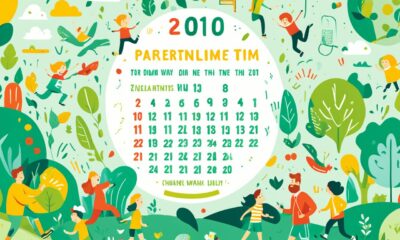
 Parenting Styles1 week ago
Parenting Styles1 week ago2023 Indiana Parenting Time Guidelines Update
-

 Vetted7 days ago
Vetted7 days ago15 Best Books on Step Parenting Every Blended Family Needs to Read
-

 Parenting Tips6 days ago
Parenting Tips6 days agoUnequal Responsibilities: When One Parent Does All the Parenting
-

 Parenting Tips1 week ago
Parenting Tips1 week agoFostering Love: How Much Do You Get Paid for Foster Parenting?
-

 Vetted18 hours ago
Vetted18 hours ago15 Best Co-Parenting Books Every Parent Should Read for Successful Co-Parenting
-

 Vetted6 days ago
Vetted6 days ago15 Best Parenting Books of All Time Every Parent Should Read
-

 Vetted6 days ago
Vetted6 days ago15 Best Books for Gentle Parenting Every Parent Should Read
